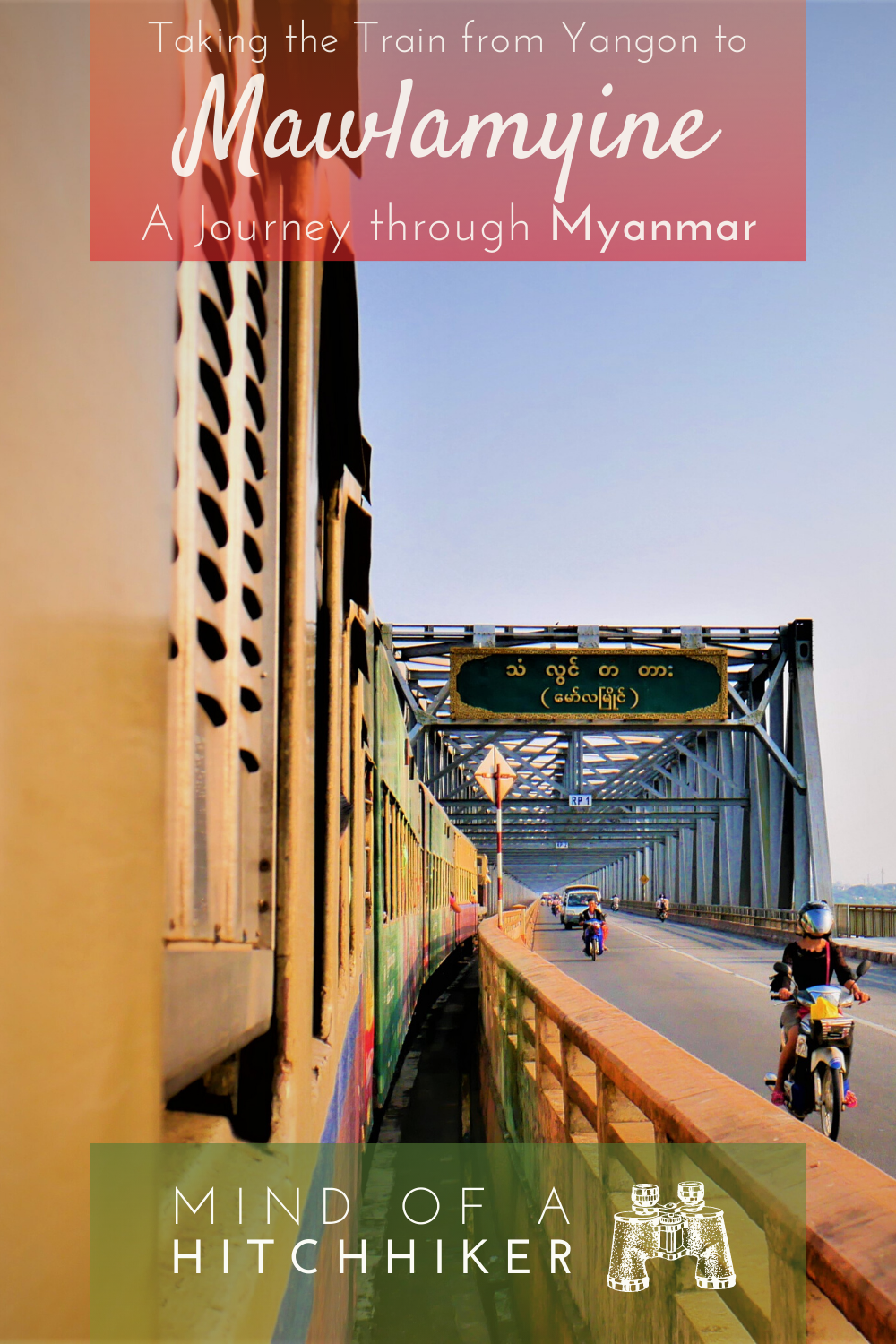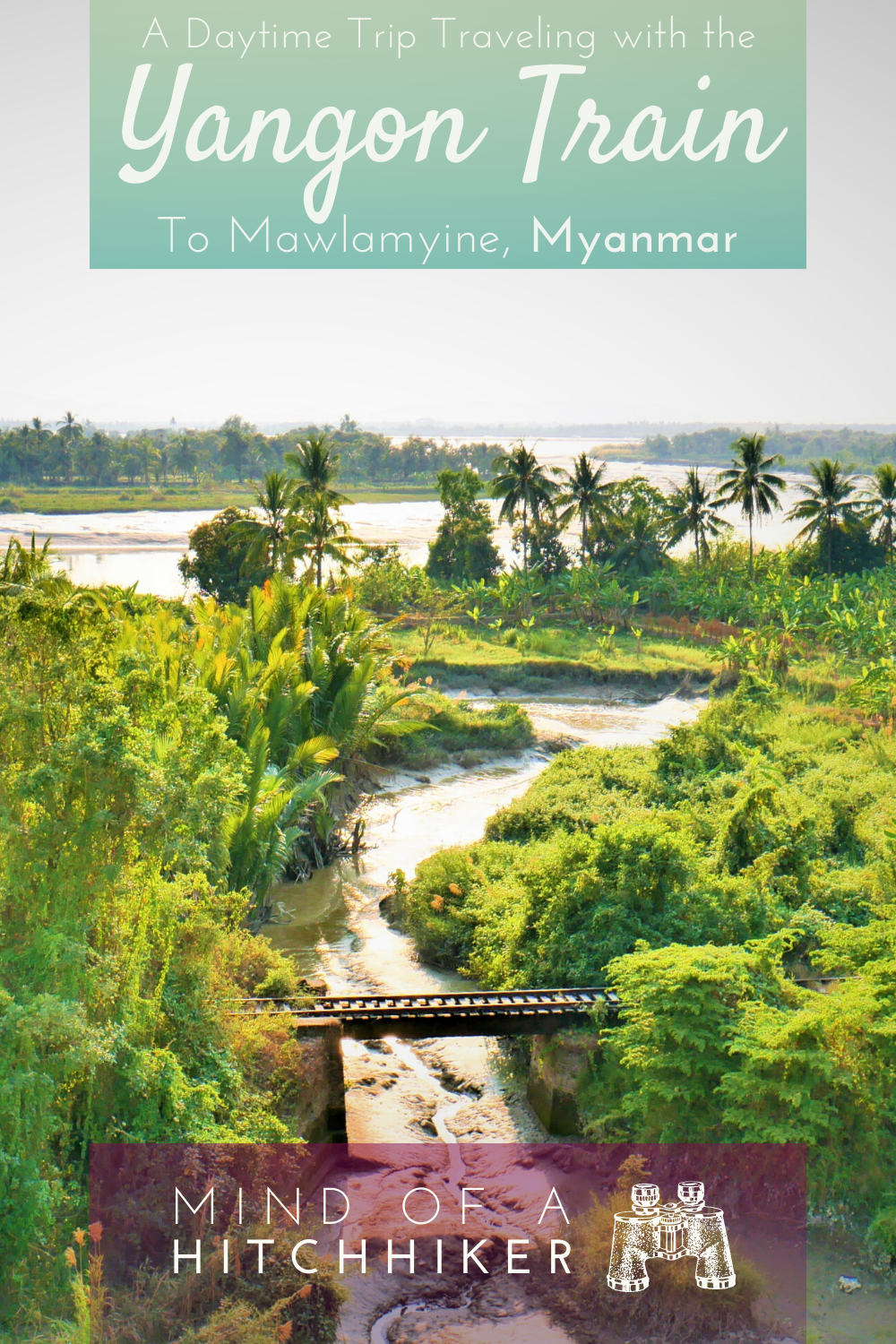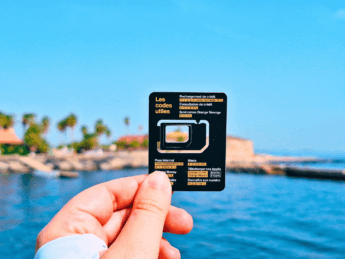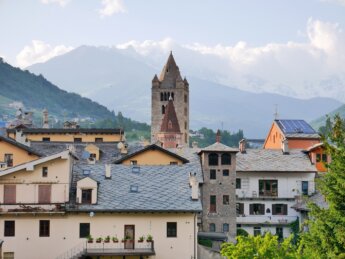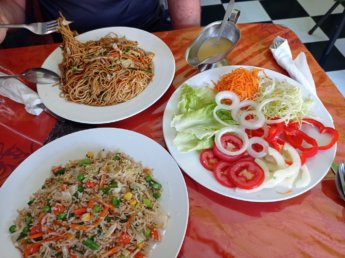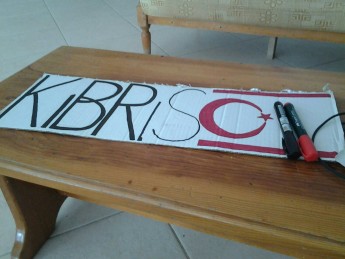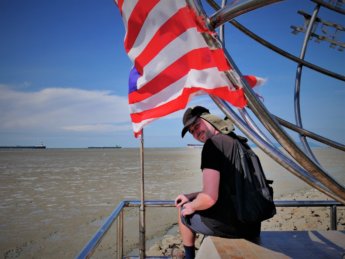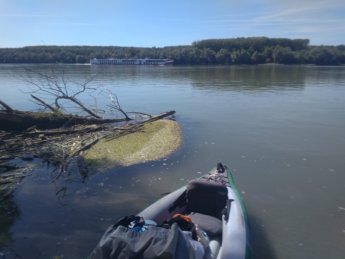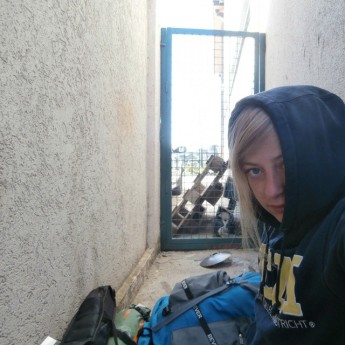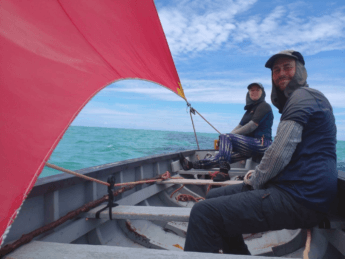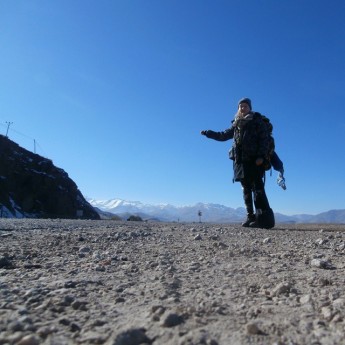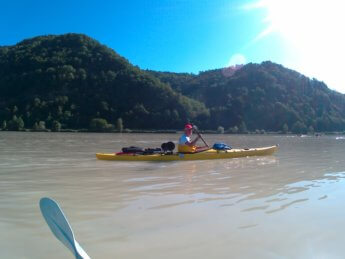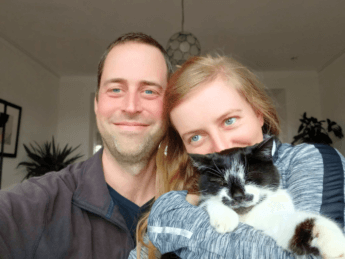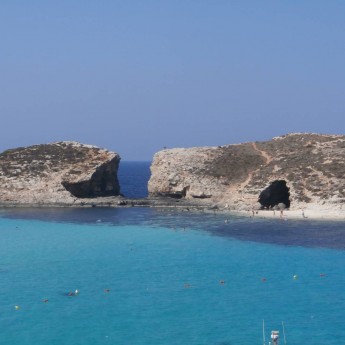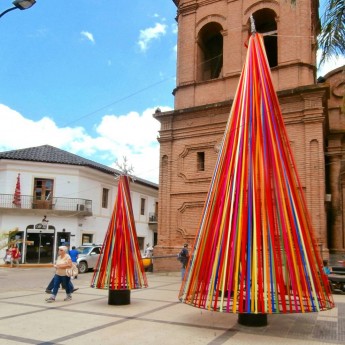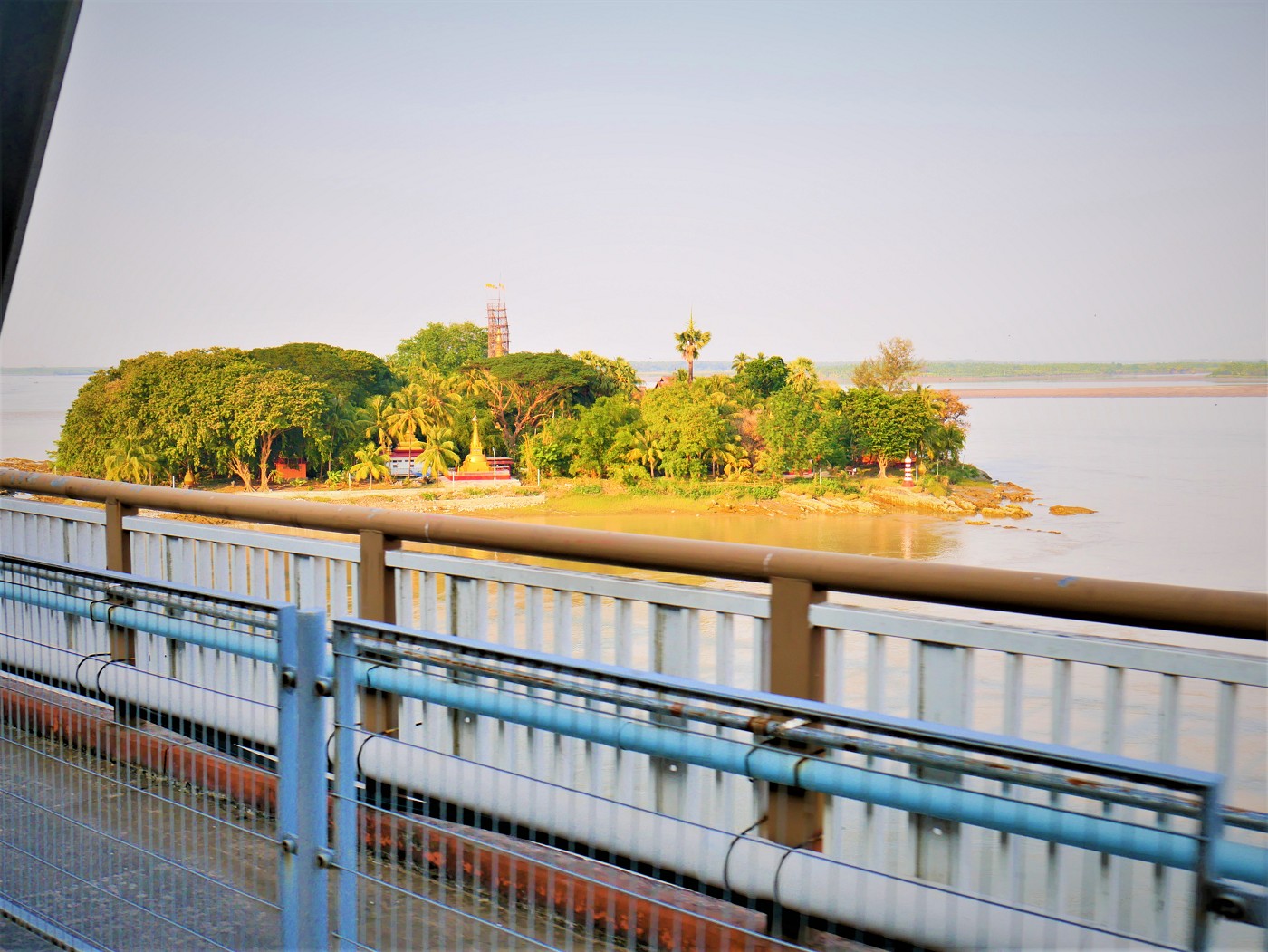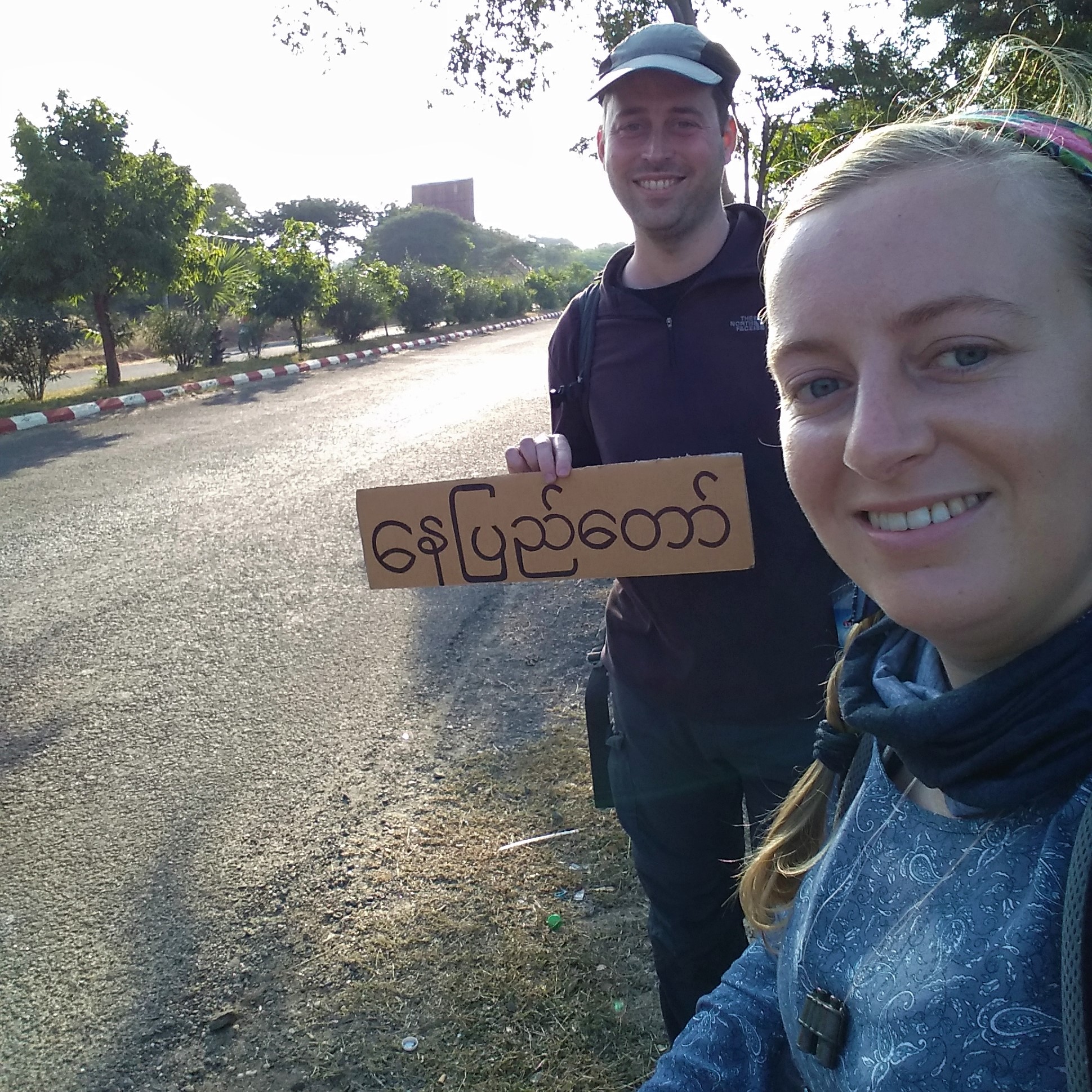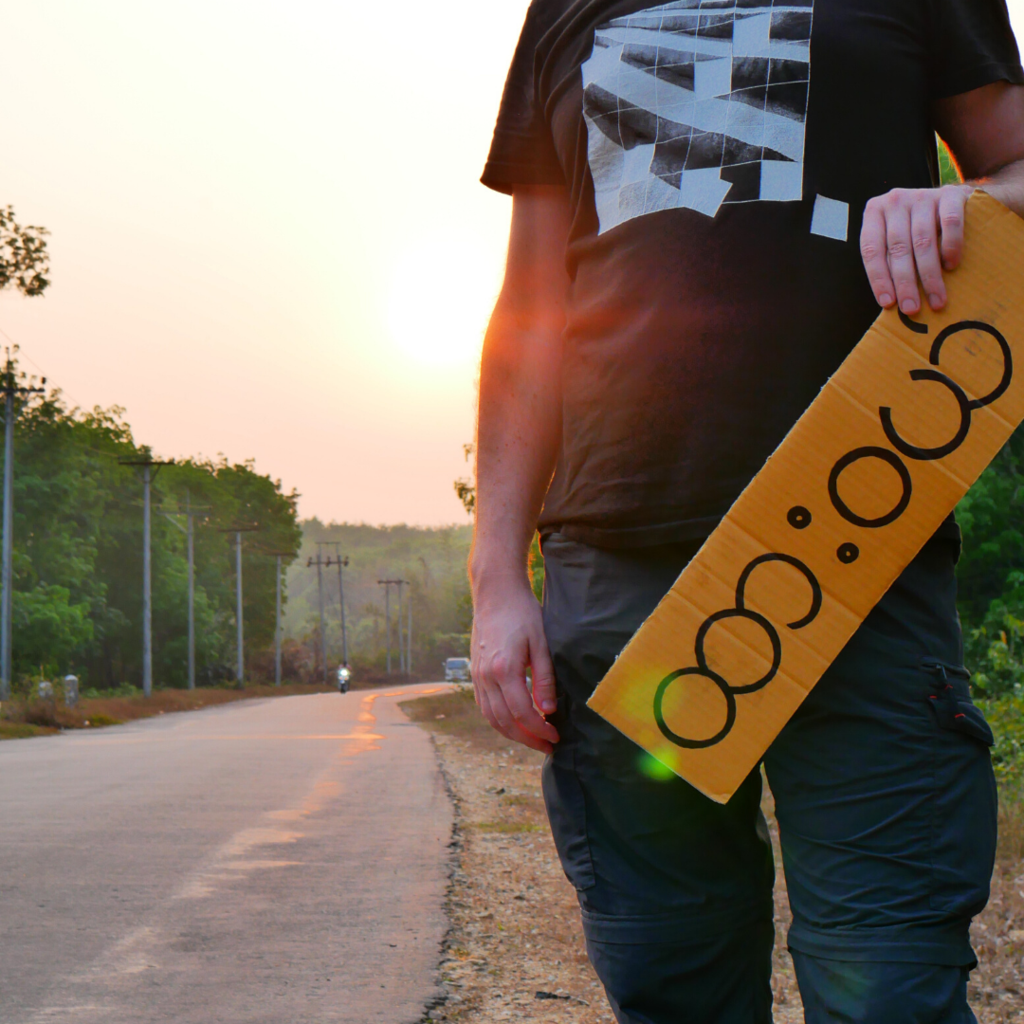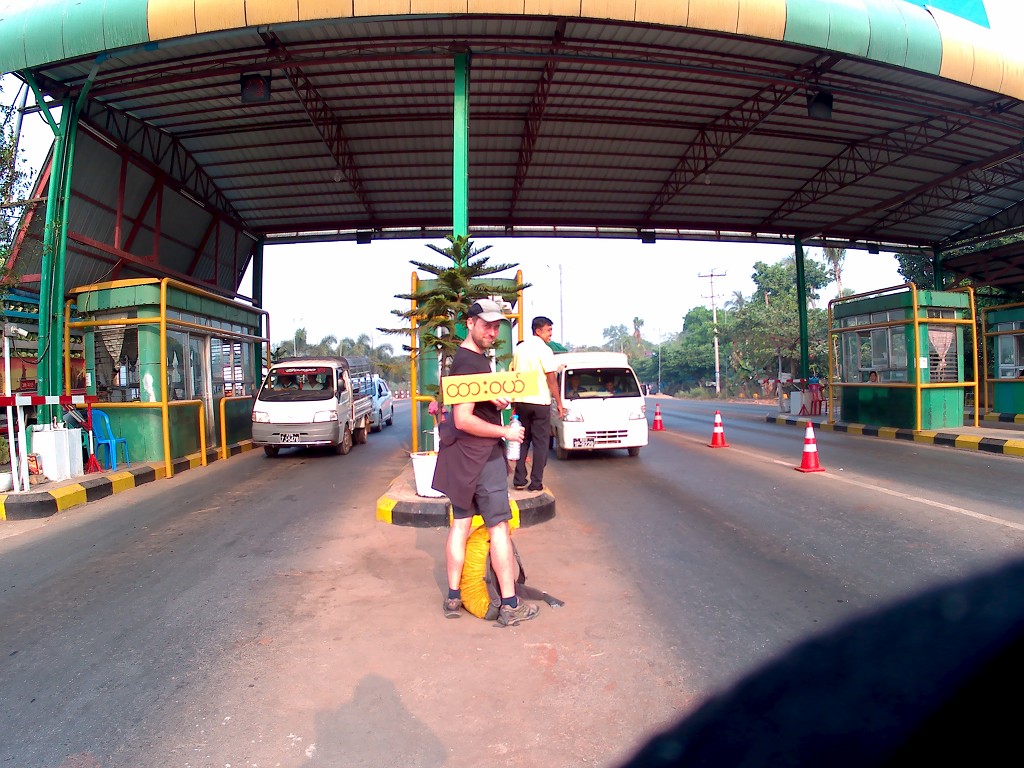This train journey occurred on Sunday the 19th of January, 2020. Jonas and I took the train from Yangon to Mawlamyine in Myanmar. “Kyat” and “MMK” both stand for the currency used in Myanmar. Click here to see the map of the route plus some tips.
Contents
- 1 A Novel Experiences: Taking a Train
- 2 Getting Tickets at Myanma Railways Booking Office
- 3 Getting to the Train Station
- 4 Getting Out of Yangon
- 5 Level Crossings
- 6 Making Slow Progress to Mawlamyine
- 7 The World’s (Second) Largest Sitting Buddha
- 8 The Most Beautiful Stretch and Candy Throwing
- 9 Approaching Mottama
- 10
- 11 Arriving in Mawlamyine
- 12 Trains in Myanmar Tips + Route Map
- 13 Thanks for Reading! Feel Free to Share or Save this Article!
A Novel Experiences: Taking a Train
Getting out of huge cities is often a problem when hitchhiking, and Yangon was no different. I’d done a little bit of research on a good place to hitchhike from after taking a long Grab ride, but it wasn’t worth it. At this point, we’d only hitchhiked twice in Myanmar: from Nyaung-U to Naypyitaw and from Naypyitaw to Yangon. It was too soon to tell if this was a good country for hitchhiking. Besides, Google Maps informed us that the distance was 310 kilometers and would take about 6.5 hours. Ordinarily, I calculate the maximum time a hitchhiking journey would take by adding two hours to it. After 8.5 hours of hitchhiking, we’d probably have a massive headache. This would probably lead to Jonas not wanting to join me for hitchhiking from Mawlamyine to Dawei later on.
I’d also promised Jonas that during our travels in Asia, I’d ease on the only-by-hitchhiking rule. In the past, whenever he didn’t want to join, I’d just hitchhike solo. Not only does this sometimes lead to tensions, but it also means we both have to do our separate research on how to get to the same place. That’s kind of wasteful.
When I’d read about the Myanma train network, I saw an opportunity to delegate the thinking to a train conductor for once. Not having to do any navigation sounded like I had to give up a lot of control, but it also sounded… nice? I don’t know. Lots of people romanticize train journeys, especially in Asia. And let’s face it; I was also a bit curious about the railroads in Myanmar.
So I suggested taking the train to Jonas, which was an out-of-character move that took him by surprise. A train journey—what a wild idea! He agreed with my motivations for taking the train from Yangon to Mawlamyine. The research of this novel method of transport began.
Getting Tickets at Myanma Railways Booking Office
Jonas figured out that it would be cheaper to take one Grab ride to the train station, buy the tickets at a person, then take a Grab ride back, than buying a ticket online. We had to get the ticket a few days in advance, but not more than three. The opening times of the booking office weren’t that generous, so we had to drive to the office directly after morning work. Some prior research on Rome2Rio showed that the ticket would be somewhere between €1.80 and €12 per person. According to them, the train journey would take 9 hours and 45 minutes and depart at 7:15.
We’d already settled that we’d get upper-class tickets to avoid having worse comfort than traveling by hitchhiking. Besides, we already get to meet and interact with enough locals by hitchhiking.
Once at the booking office, it wasn’t hard to get a ticket. It was very quiet in the early afternoon and the staff in the little ticket booths looked bored. We asked one guy for “Maw-la-meen?” which he understood, despite our mangled pronunciation. He pointed us one office down, where the guy had already received the news that we wanted to go to Mawlamyine.
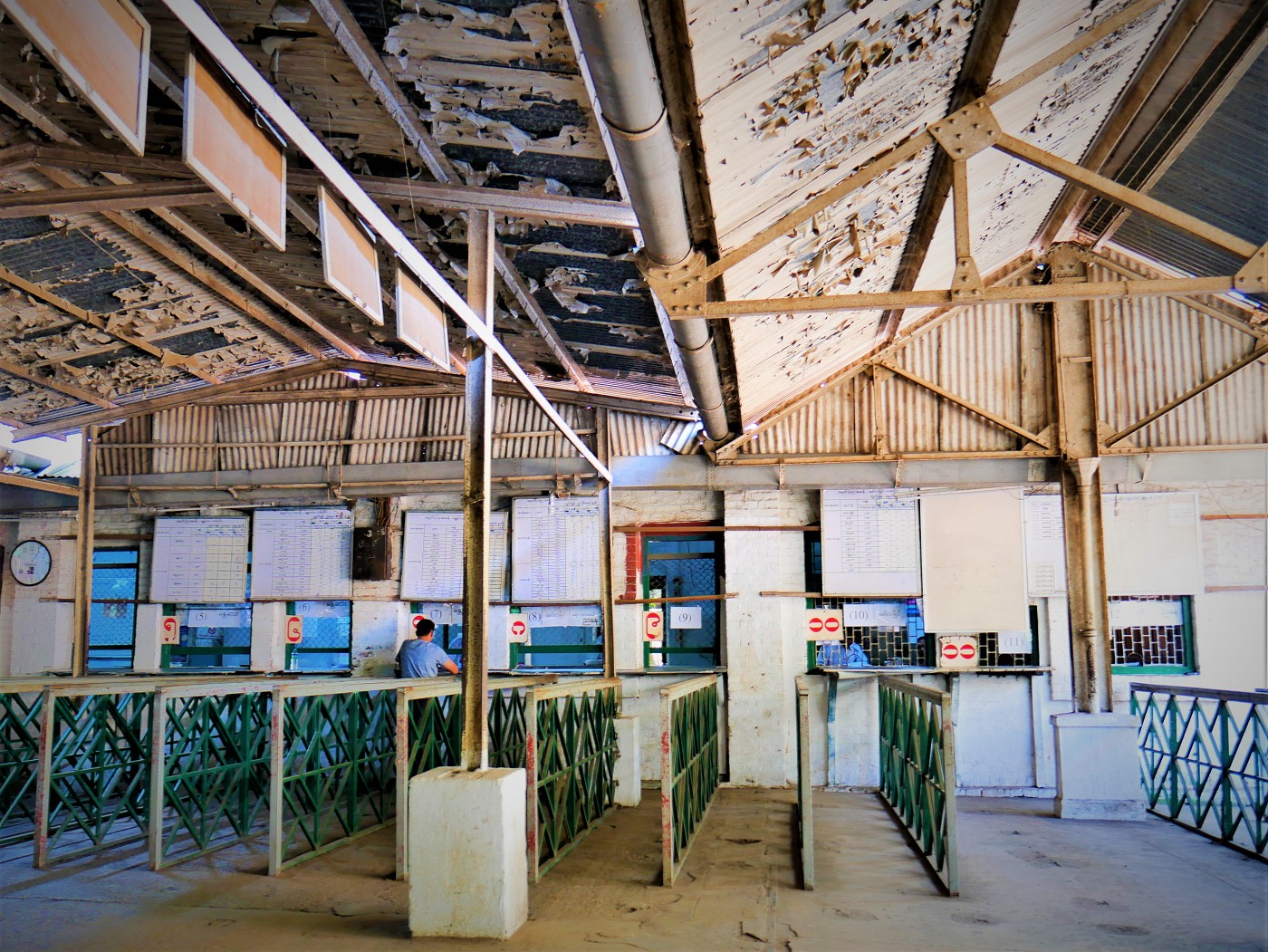
We asked for the Sunday train at 7:15 in the morning and handed over our passports. First of all, the train would depart at 6:30 and not 7:15, the man corrected us. He didn’t even ask which comfort level we wanted, and just booked us two upper-class seats on his paper list. Yes, it was a paper list that kept track of which seats were booked and which were still available. Absolute madness.
“Platform three, train 89 at 6:30” he repeated. “The price is 8,500 kyat.” That was €5.23 for the both of us. Incredible!
After getting the tickets, we walked across the bridge to stake out the train station in anticipation of our journey. We found platform three and saw how busy it was now in the daytime.
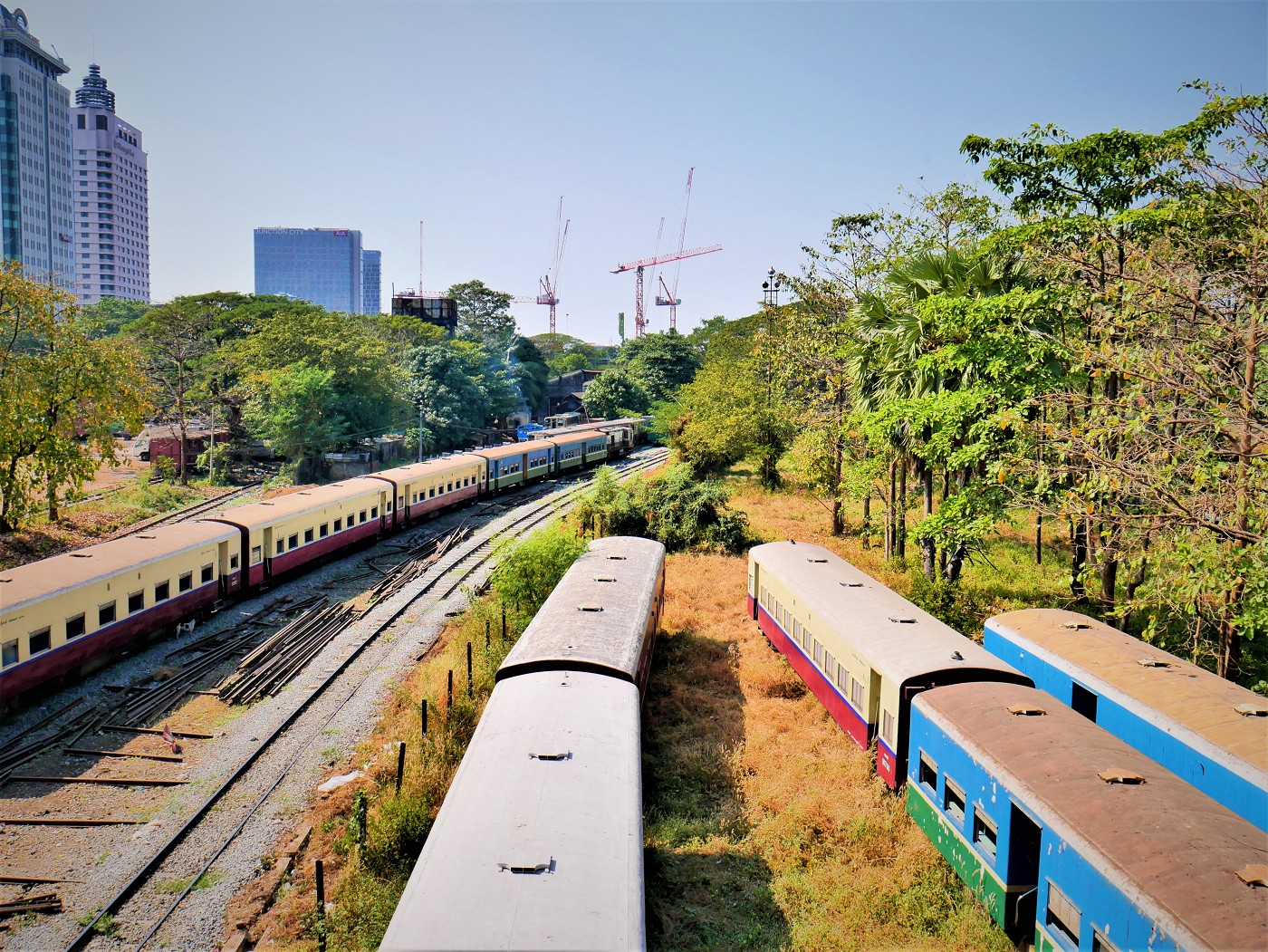
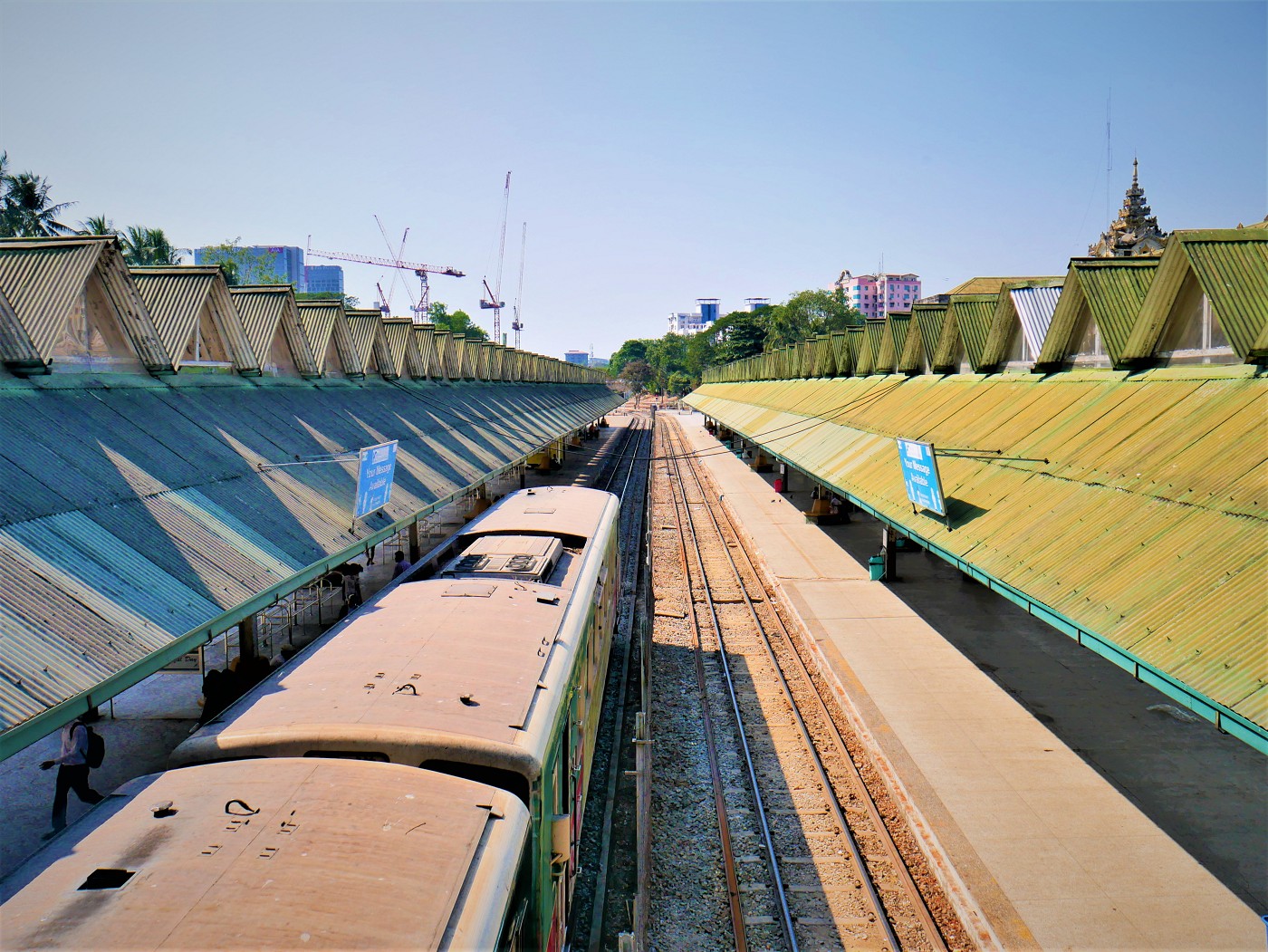
At home, we took a closer look at our tickets and saw something weird: one had seat B-6 and the other seat C-6. Did this mean we wouldn’t sit together? We Googled the interior of a Myanma train car and saw that the upper-class seats were three per row.
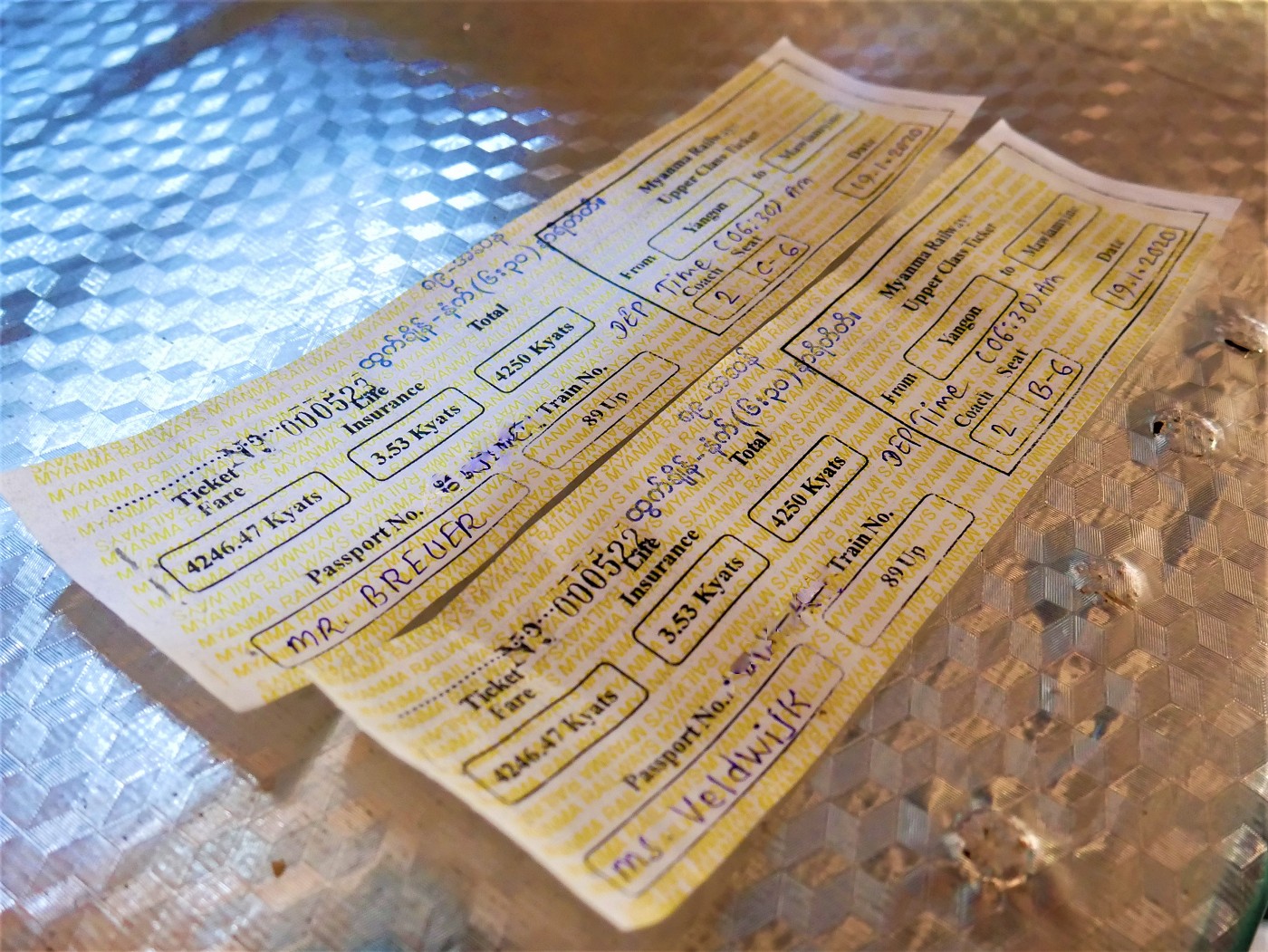
Getting to the Train Station
On the morning of departure, we woke up early in our Airbnb in Yangon. We’d already packed our backpacks the night before, so we only had to put on comfy clothes. I’d bought some longyi the previous day, and decided to wear that on the train over my shorts. By 5:45, we were out the door and waiting for our Grab to find us.
In Yangon, the experiences of taking Grabs had been… frustrating. It had already happened a bunch of times that we ordered a Grab, got accepted by a driver, and then the driver would drive to the destination instead of the pickup point. Or they’d wait for us in our general vicinity but expect us to cross the mayhem of a major street and then still walk two blocks to find a car in a sea of identical-looking cars just going by the license plate. Or they’d call us on the phone and try to ask us where we were. Just follow the GPS, dammit! And because all grabs in Yangon are cars and not tuk-tuks, the two of us and the whole city would invariably be stuck in traffic for the entire journey.
The total fuckery of Grab combined with the hustling nature of the city made us regret staying in Yangon for five nights instead of elsewhere in Myanmar.
We’d hoped that leaving this early in total darkness before the commuting hours commenced would help ease on the fuckery, but alas, our driver again couldn’t find us. Even though the distance from our house to the train station was only seven kilometers, we’d planned in plenty of buffer time to allow for this to happen. When our taxi finally showed, we weren’t particularly worried about arriving on time.
The route via Lower Kyeemyindaing Road winds past several shops that produce the shiny golden umbrellas (hti) that top the pagodas. In the pre-dawn hours, the gold still shimmers despite the lack of light. Traffic was light and by 6:45 we rolled into the taxi stand.
We arrived at the train station well before the departure time. The station hall was already buzzing with activity in the cool morning air. The train was already waiting. A vendor helped us find our wagon and our seats, after which she asked us if we wanted any food, drinks, or items. Jonas asked how much coffee would be and agreed to the price of 2,000 MMK. She repeated the order to a girl child who went out to get a coffee for Jonas. I got a pack of tissues in anticipation of a coffee spill.
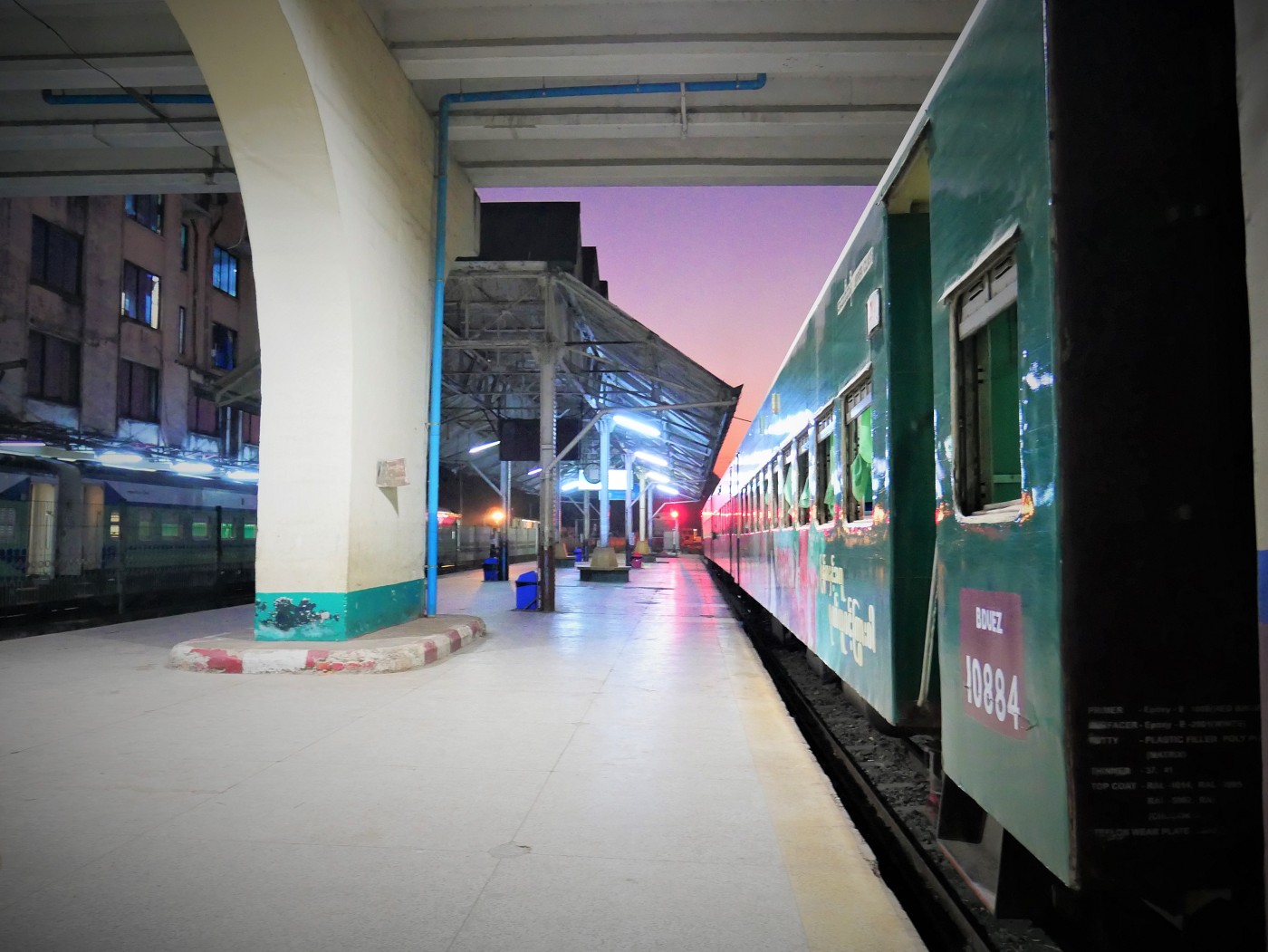
The seats had a green cover and were quite comfy. Jonas helped me put my backpack on the overhead luggage rack that was far out of my reach. He added his backpack to the lump. Some other foreigners entered the train and got the seats in front of us. They looked at our hovering luggage with suspicion. More people got into our wagon, including a large family that took up almost all the single seats across the aisle. Their teenagers didn’t have headphones to listen to their music and one boy unhinged his seat to have it yaw almost 360° while reclined. Having settled into my seat next to the perpetually open window, the drowsiness took over despite my annoyance.
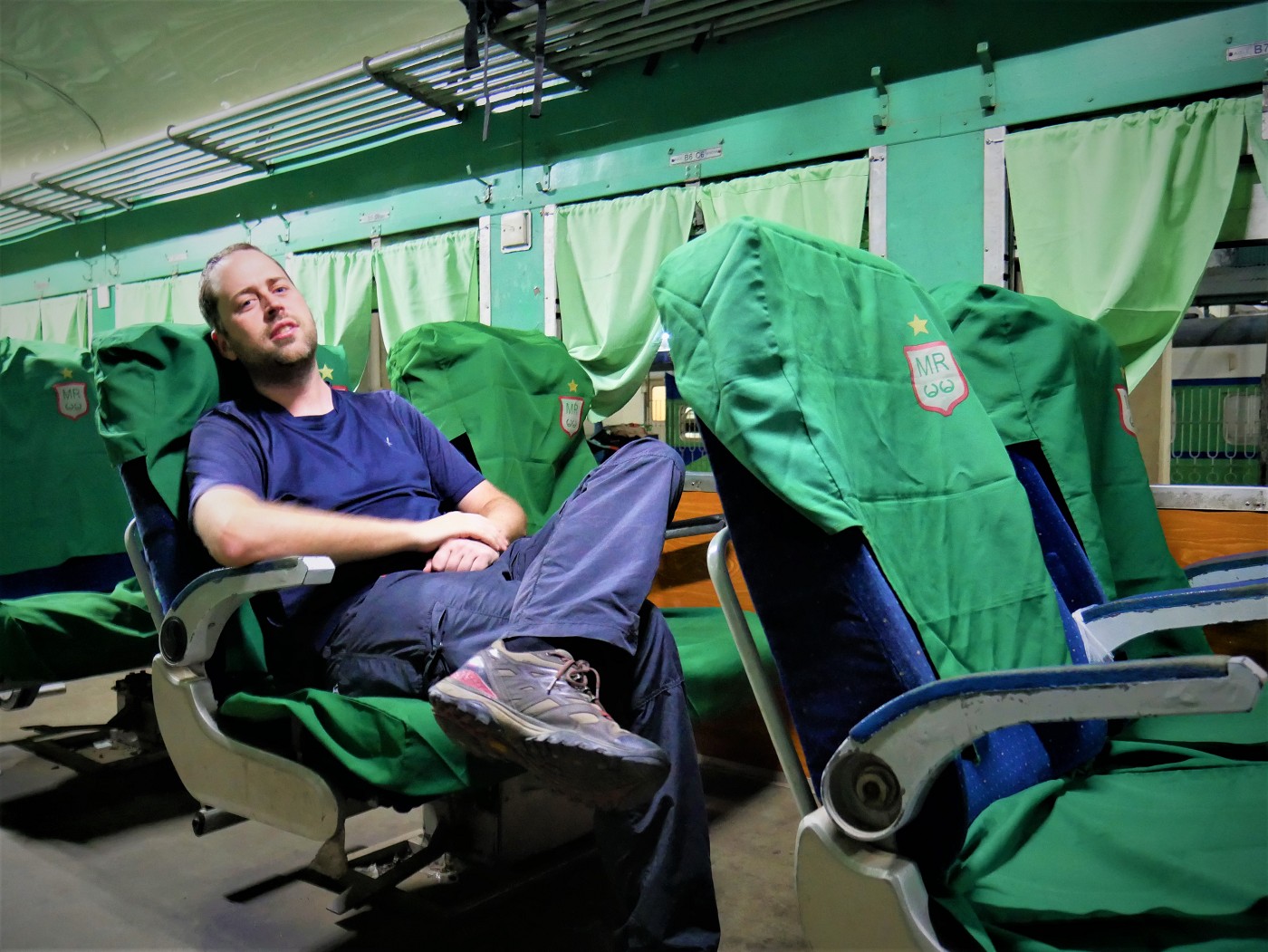
A few minutes before 6:30, the train started to make sounds to get ready. We started rolling a bit forward until the nudge became a motion and we were headed to southern Myanmar. I tucked the curtains away to look out the window as the vendors moved away from the mean machine.
Getting Out of Yangon
The train was loud in multiple ways: the metal clanked on the rails, the wood creaked from the swaying, and the passengers umphed in diScOMfoRt. On top of that, the conductor pressed Y to honk at the entirety of Yangon. Through poor neighborhoods and bespoke moneyed quarters, they all got the same sounding treatment. I can imagine they were like “Fuck it, if I can’t sleep and have to work at 6:30 in the morning I’m going to take y’all down with me.”
The parts of Yangon that directly bordered the railroad tracks were in a pretty poor condition. There was lots of trash and people burning trash this early in the morning. That trash clogged every canal and river we crossed. Flocks of pigeons and packs of street dogs roamed the mess. The humans of the precariat wandered among it.
Myanmar is also a country of wet concrete—a sign of people making improvements to their environment.
Despite the coffee, my drowsiness took over. So I layered up against the cold and doze off.
Level Crossings
We make several brief stops in towns during my slumber. I awake about three hours later when we stop in Waw (ဝေါ). I get another coffee from one of the many vendors on the train for the price of 300 MMK. A steep drop in price compared to the Yangon train station rate.
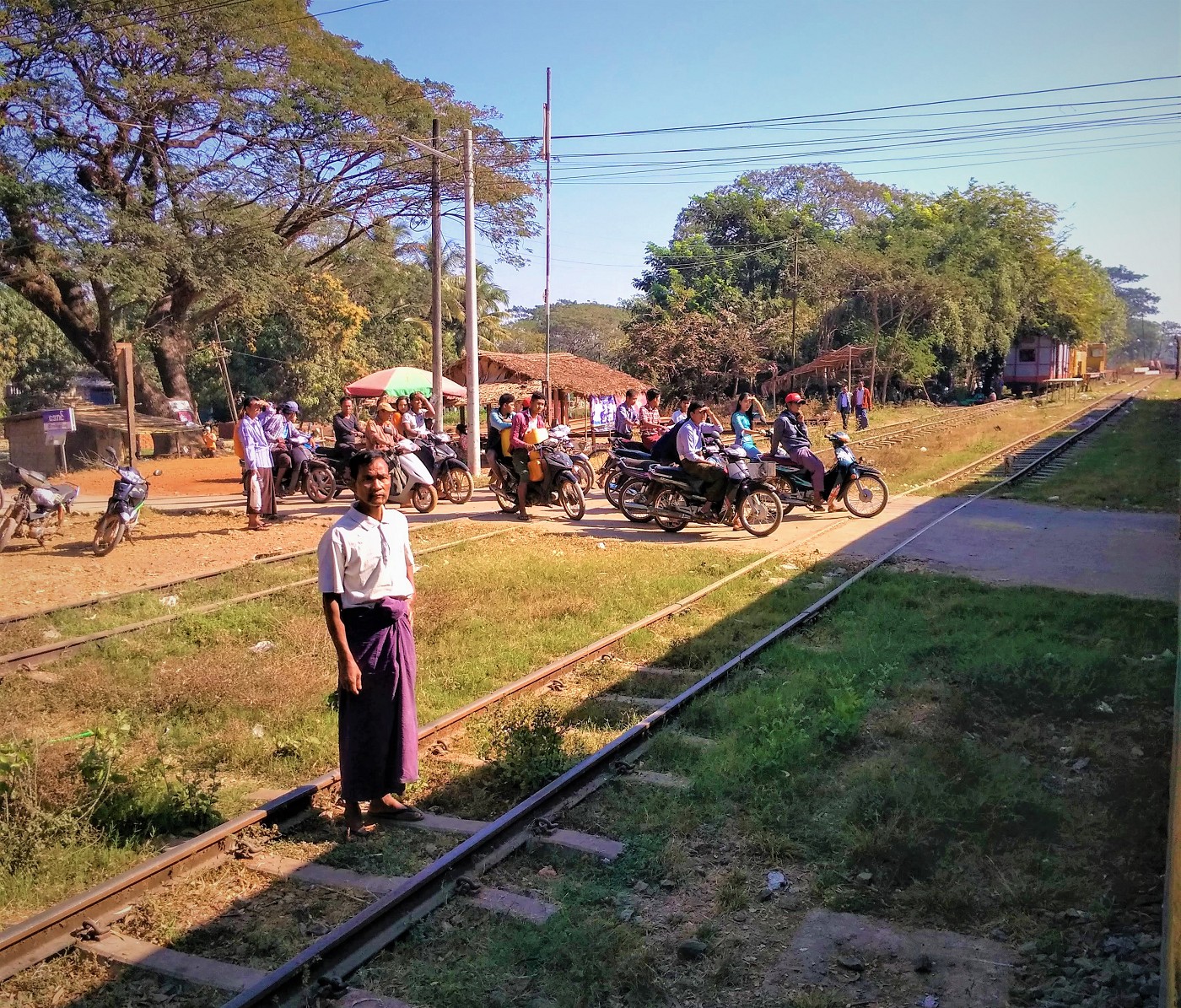
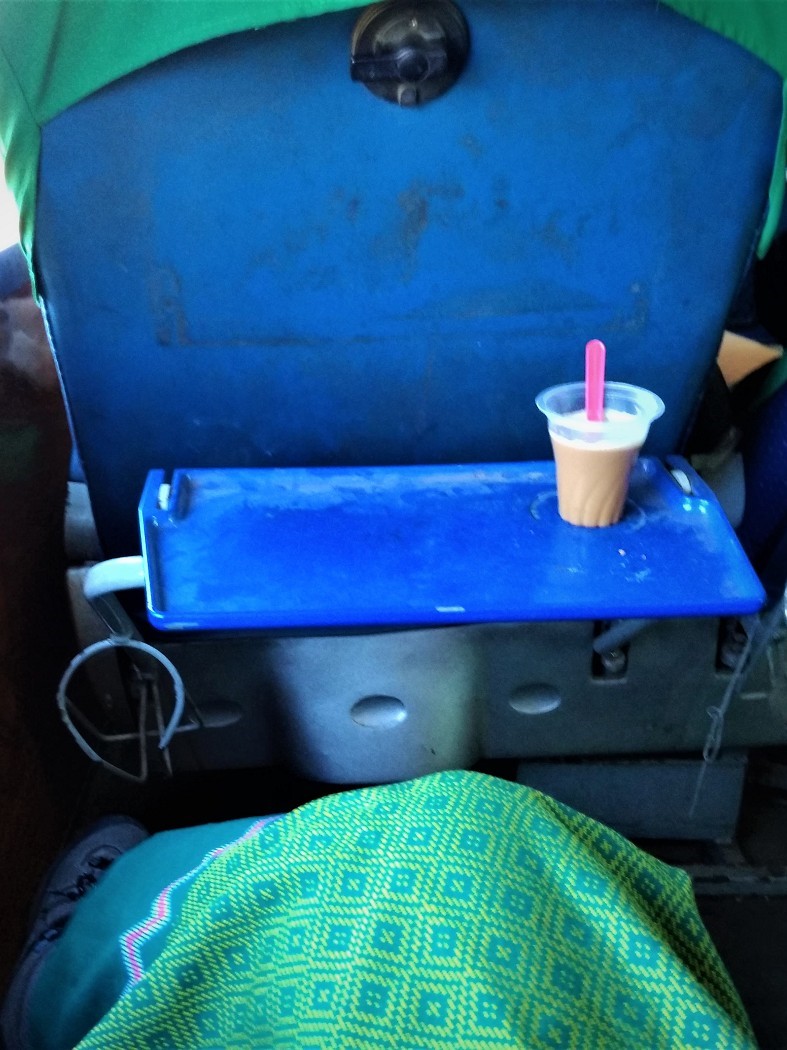
Lots of roads cross the train tracks all the time, alternating with rice paddies, farmhouses, and pagodas. In particularly trafficked areas, people manually operate the gates to close off the road to let the train pass. Impatient motorcyclists and pedestrians pile up until we’ve rolled through at a slow pace.
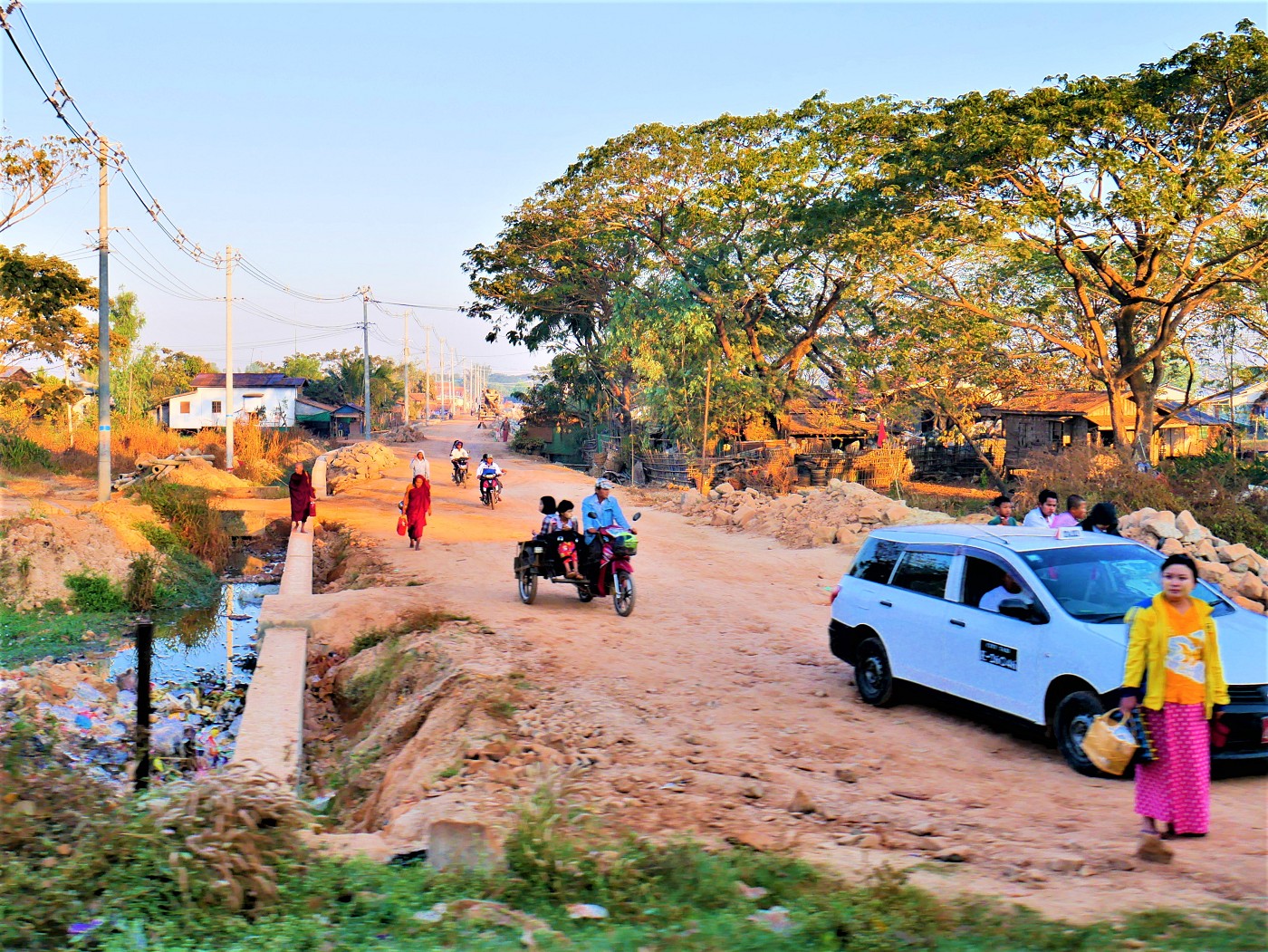
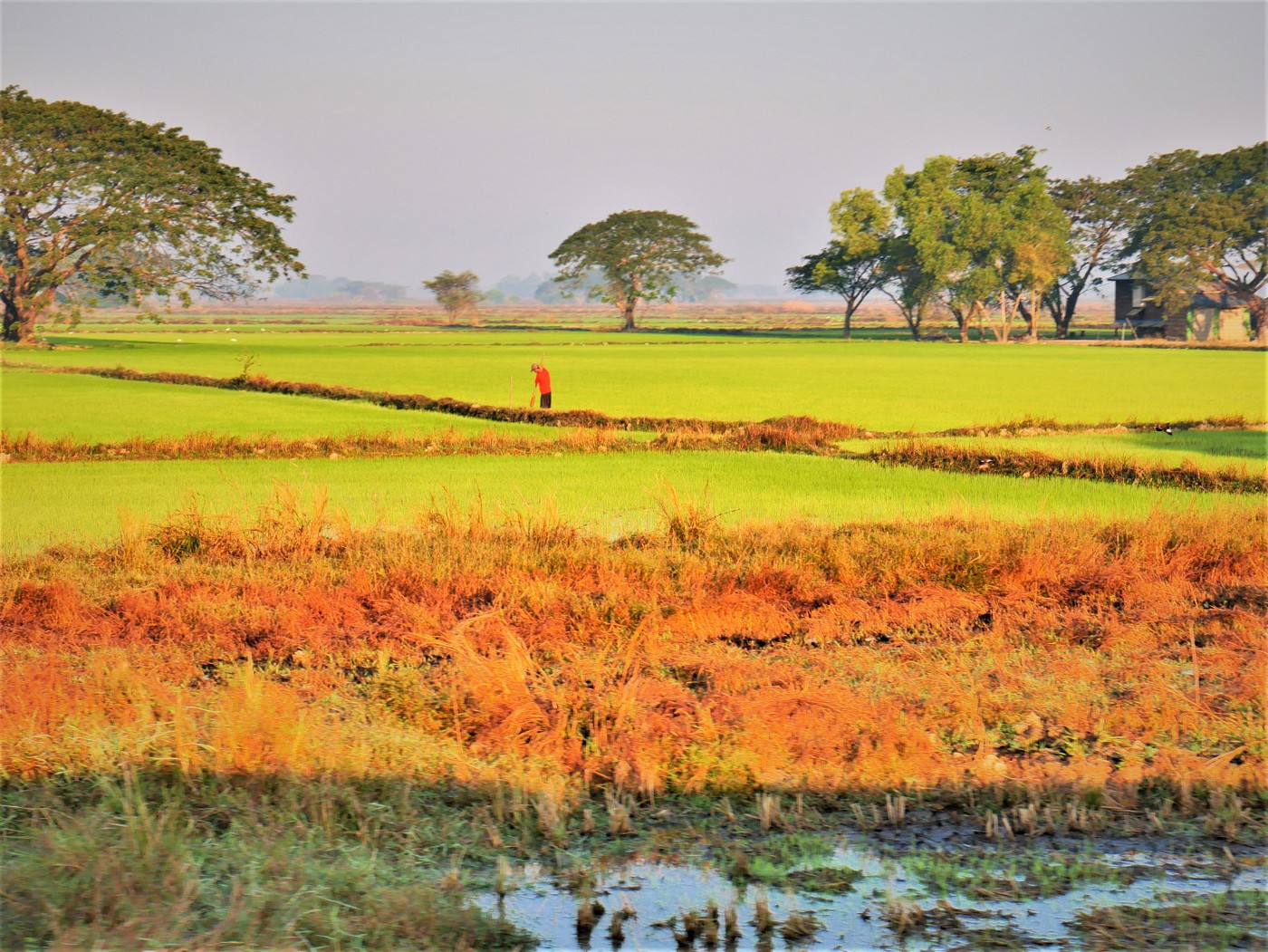
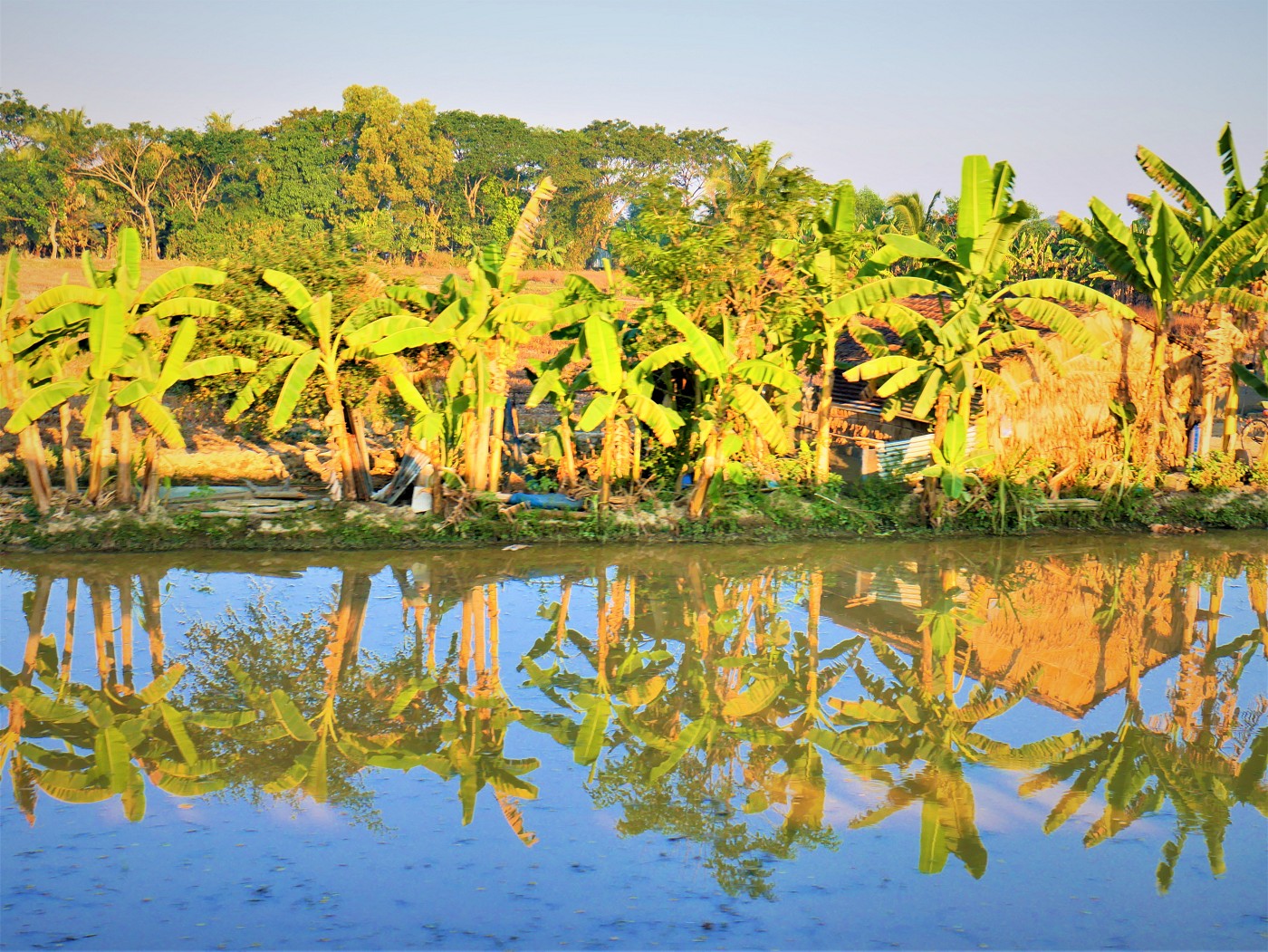
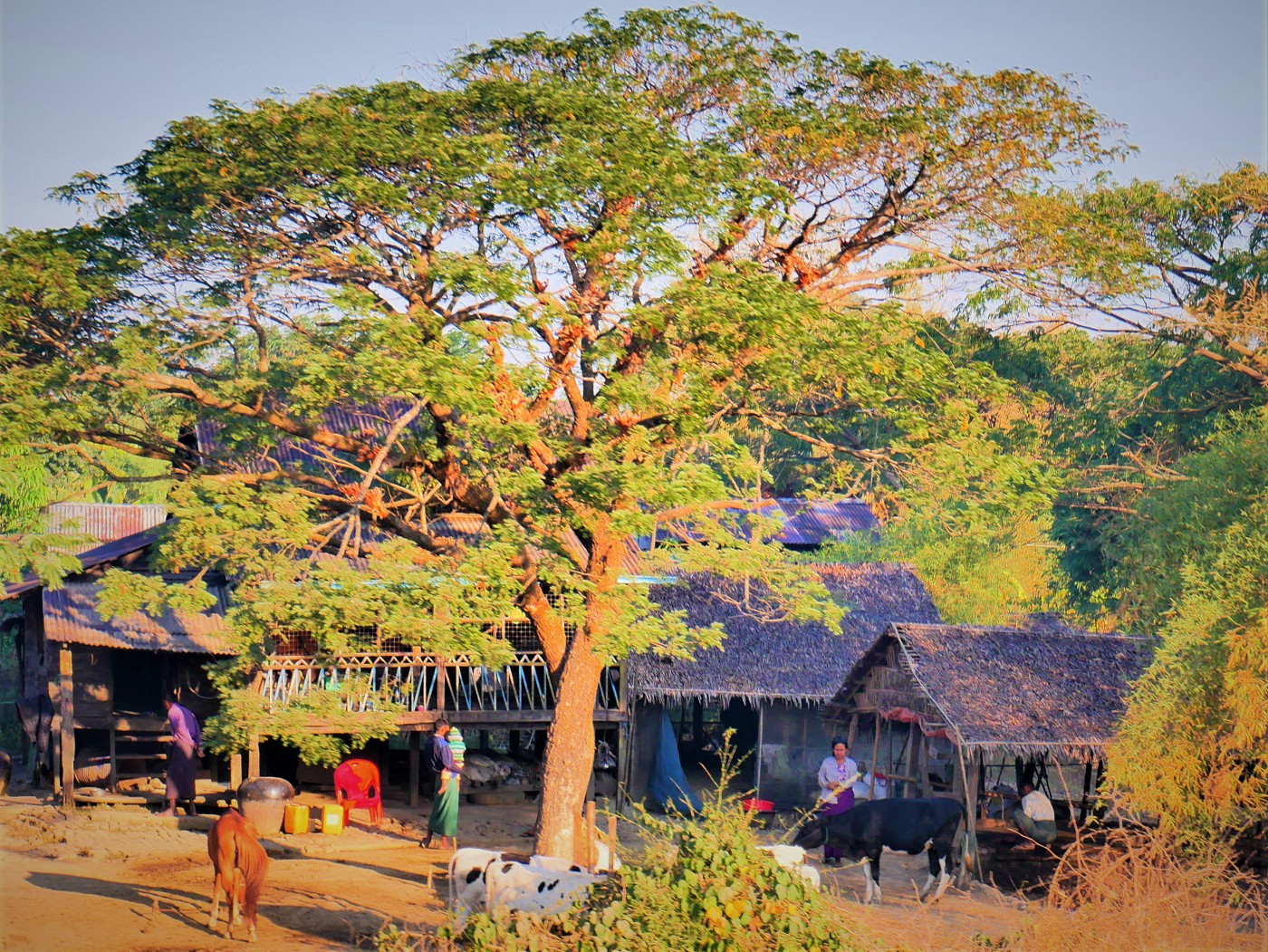

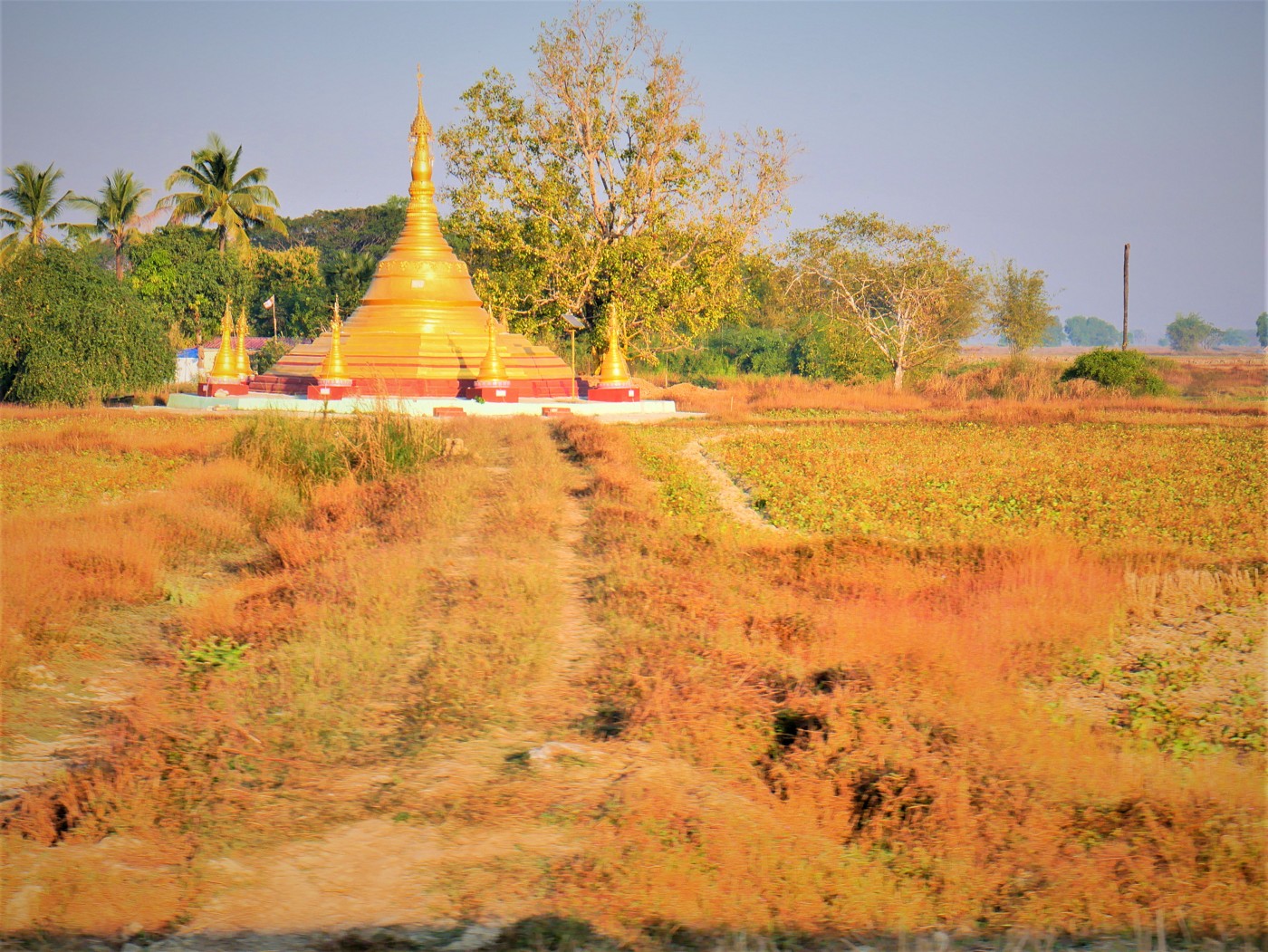
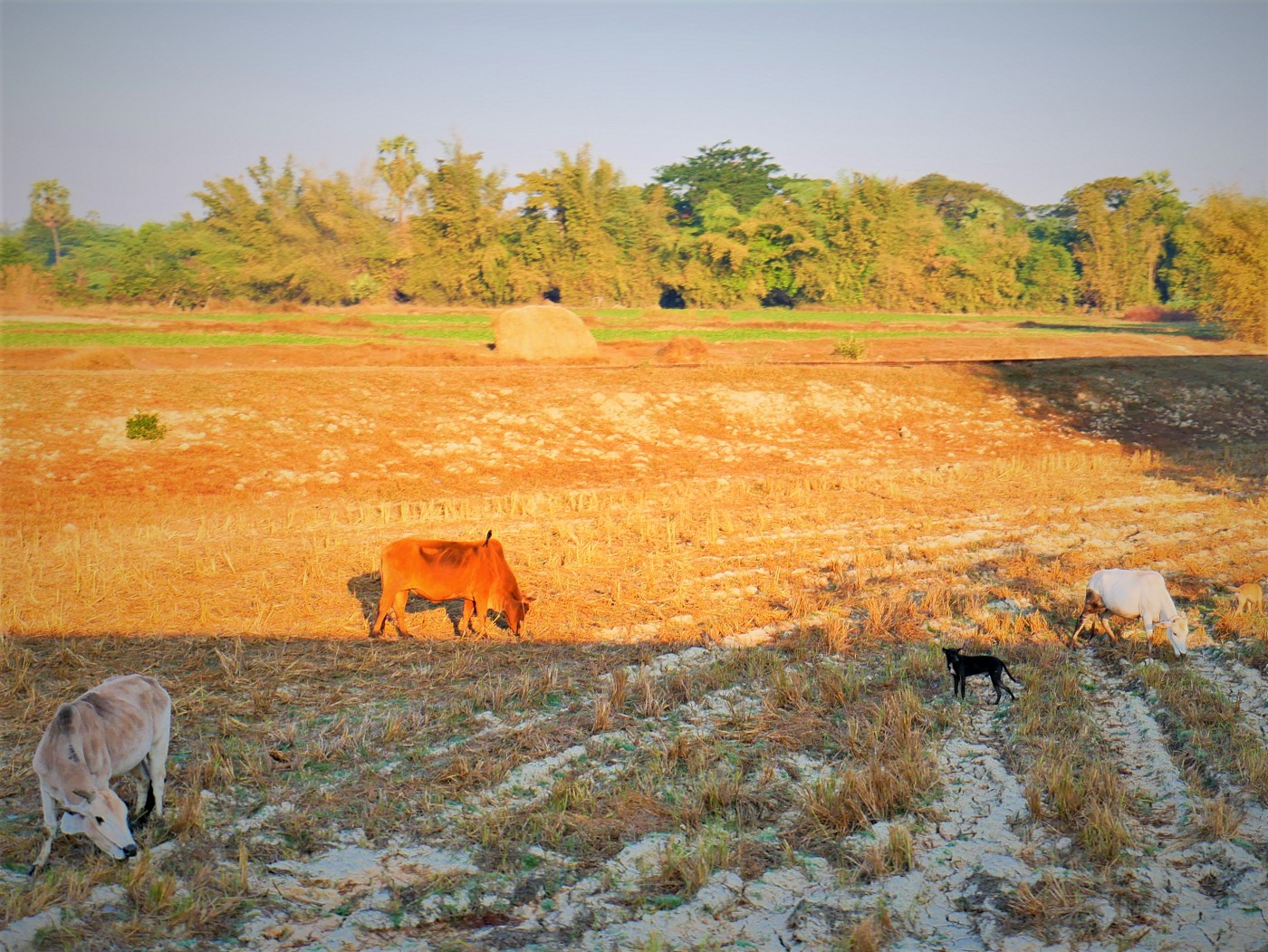
I’d like to say that I’d gotten used to the clanking sound of the train, but that would be a lie. It’s still mind-numbing and obstructing the dreamy-eyed pensiveness people associate with train rides. I put in my headphones to drown out the sound with music, which doesn’t really help because the sound corresponds to the movements of the train and vibrates through everything. I’d like a break from it.
Making Slow Progress to Mawlamyine
From Waw it’s not far to the Sittaung river (စစ်တောင်းမြစ်) crossing at Thein Za Yat (သိမ်ဇရပ်), so I try to stay awake. Though it looks like a short distance on the map, this still takes about 30 minutes. The top speed of the train lies at a casual pace of 25 – 35 kilometers per hour on the longer stretches between small stations. Much earlier than anticipated, I lose track of the number of stops we make between Yangon and Mawlamyine. Sometimes the stops are longer, which can’t be explained until a train passes us from the opposite direction.

Every now and then there’s an unfinished pagoda. It looks almost brutalist like this and I’m here for it.


The size of the train station doesn’t matter one bit. Whenever we stop at train stations, vendors appear parallel to the train to sell stuff through the open windows, including the Carabao energy drink that made a kid vomit many times while we were hitchhiking. I wouldn’t be surprised if people actually puked on the train when combining this drink with the shaky movements of the train.
Vendors look at us from below and quickly decide we’re not in the market for what they’re selling. It’s mostly true. Some vendors enter the train to sell in person. They lift big round plates with prawn cakes stacked dangerously high. I would absolutely scream if something like that would fall into my lap while I’m dozing off.
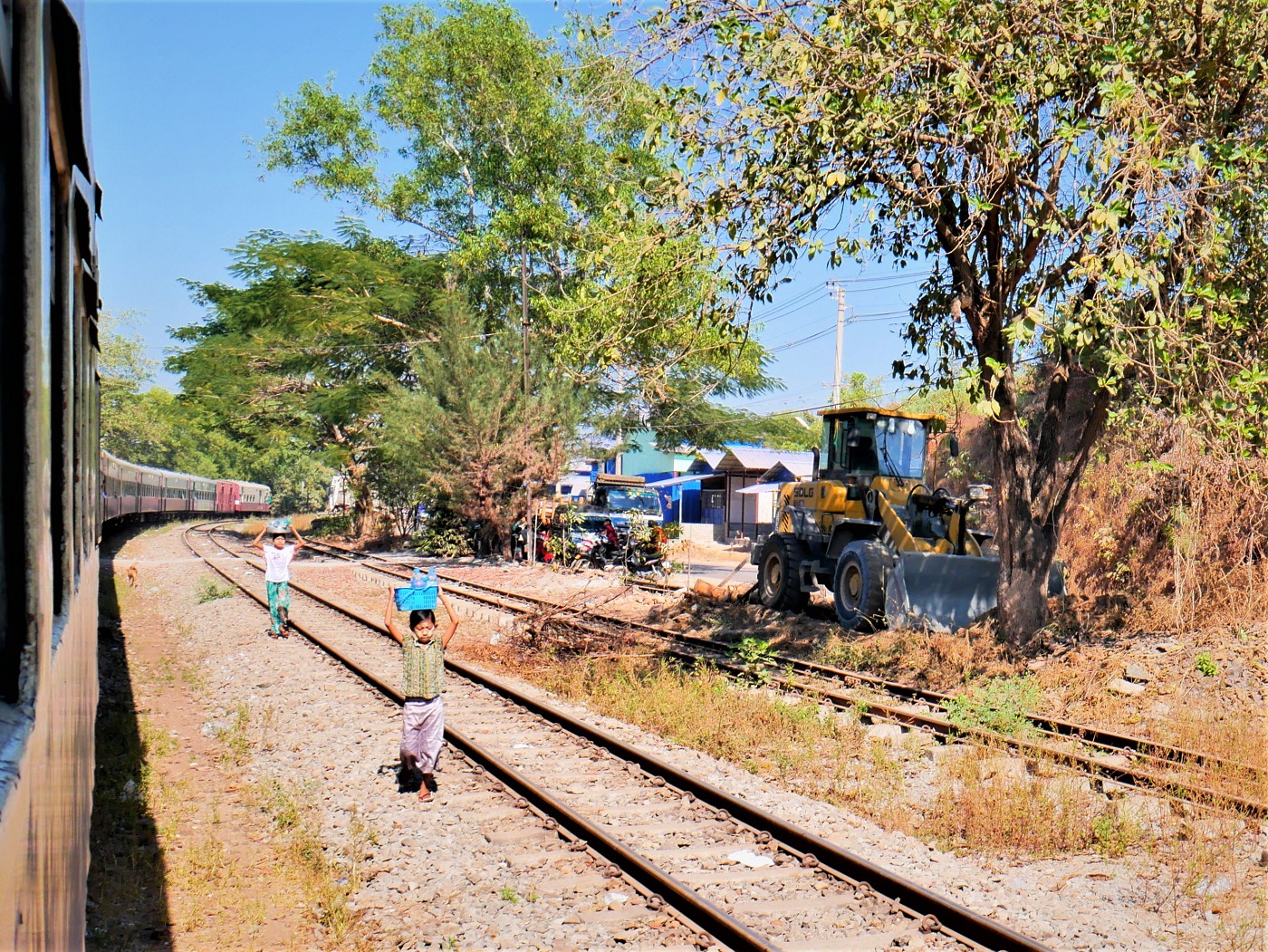
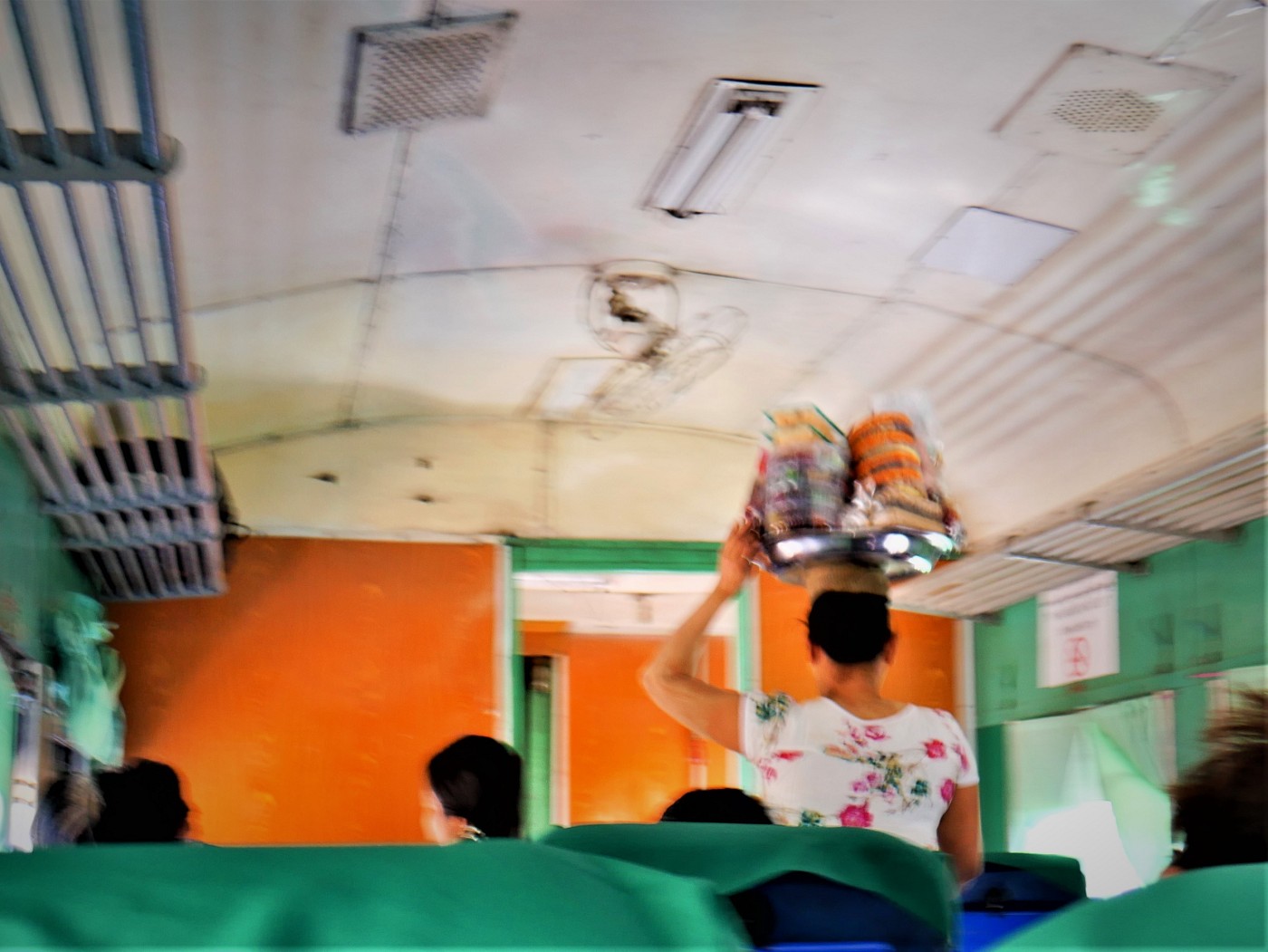
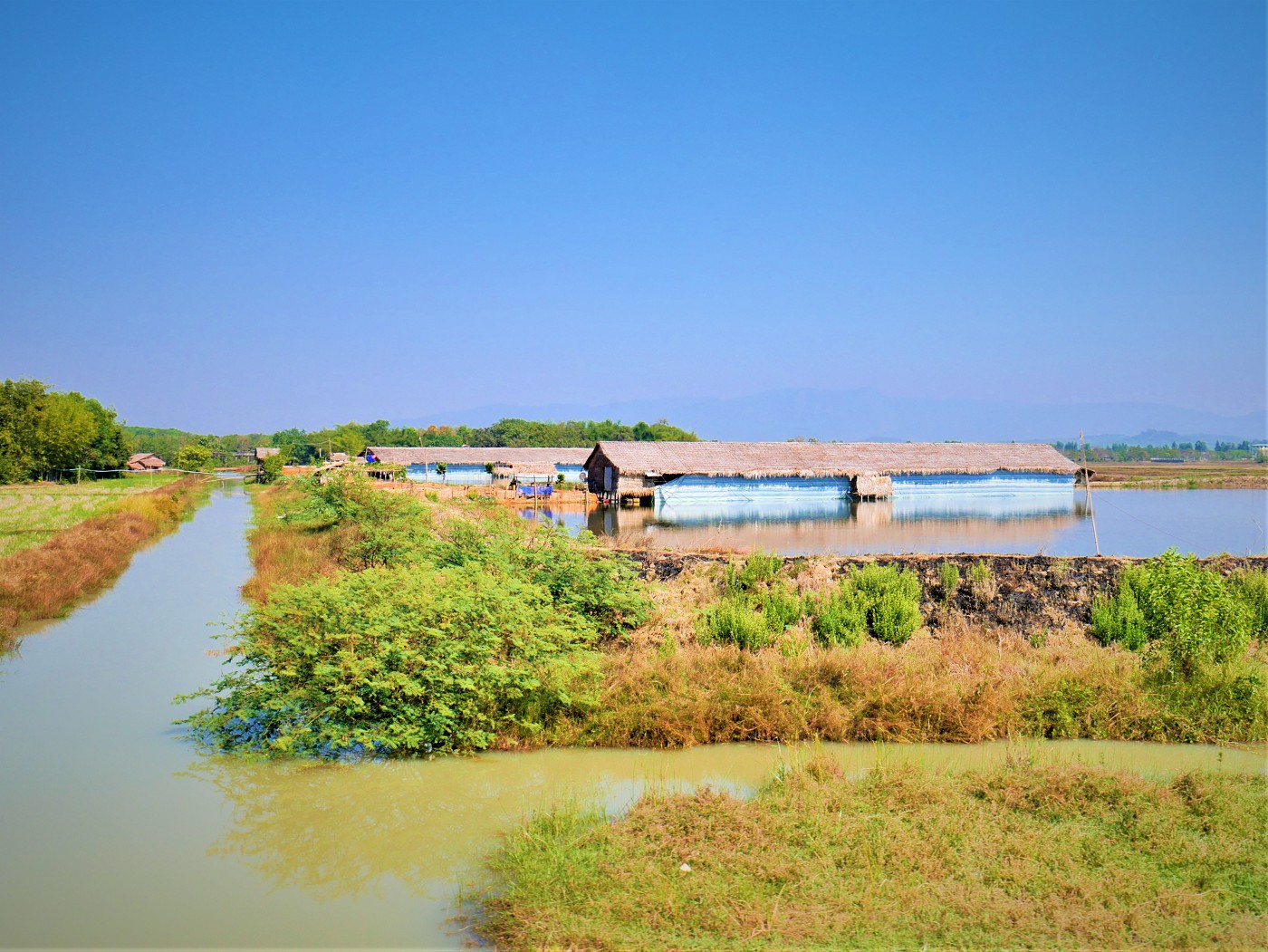
The landscape alternates from well-irrigated wetlands, fish farms, and ditches to dry and dusty earth. Only if you keep staring hard, you can see the outline of mountains through the faraway haze. Predatory birds and kinder ones share the skies.
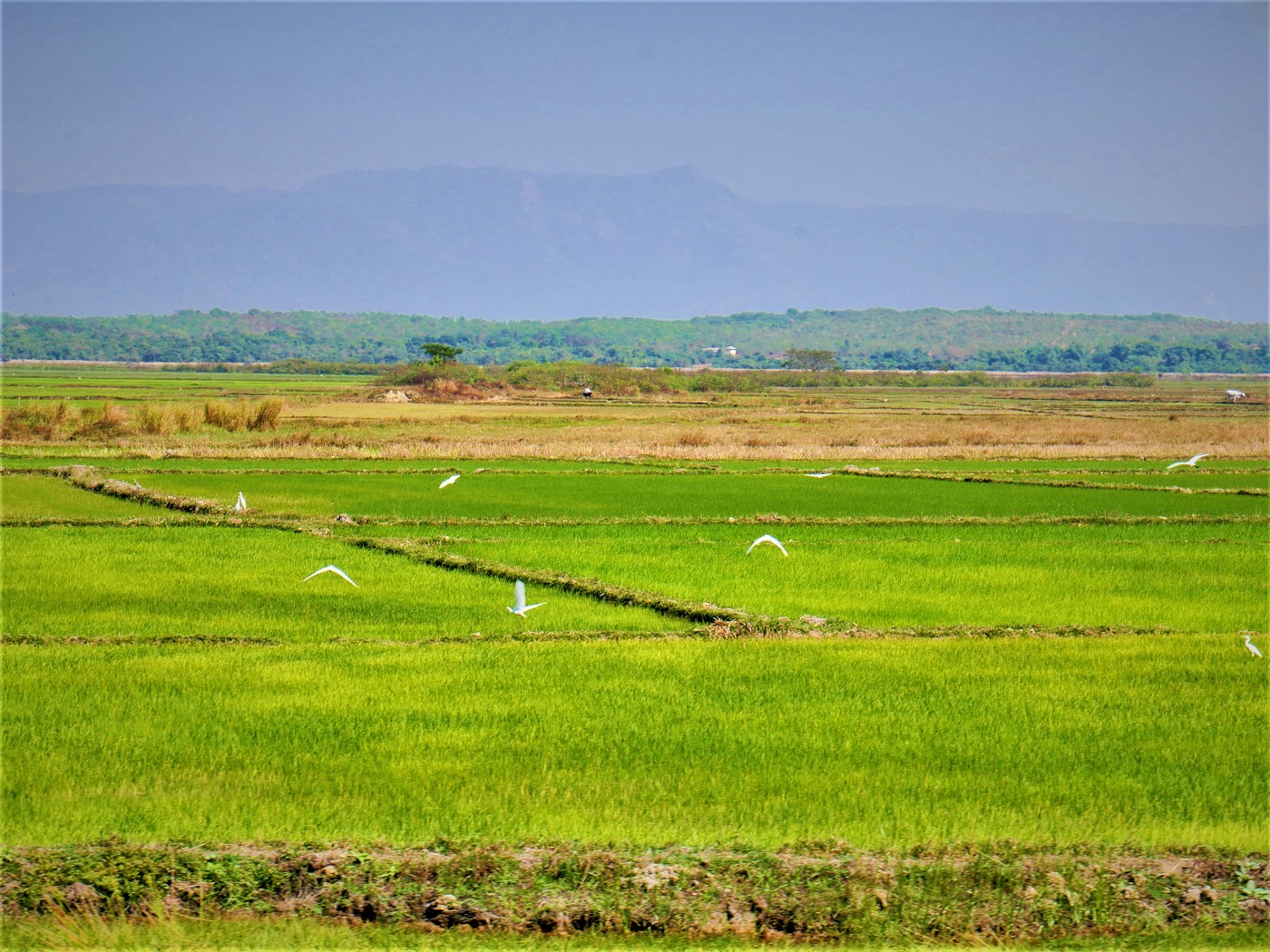
Parts of the area next to the train tracks are very dense with bushes and trees. I’m assuming a train passes this stretch once or twice a day, but it’s not uncommon for the young leaves of a twiggy tree branch to snag onto our permanently open window. Small confetti of freshly-grated greens settles near the window seat. It’s a small testimony to the benefits of not sticking your head out the window of a moving train. Tempting, yes—good idea, no.
We follow the direction of the Sittaung river southward until we bend eastwards away from the delta. By the way, the Sittaung river gets some amazing surfable tidal bores, as seen by this guy’s videos.
The World’s (Second) Largest Sitting Buddha
We’re approaching Kyaikto (ကျိုက်ထို) at 11:30 and I know I should pay attention. Kyaikto is a destination because it’s near to the Kyaiktiyo Pagoda (aka ‘Golden Rock’) – a 45-minute drive away into the mountains from Kyaikto. We obviously won’t be able to spot that from our moving train, but that’s also not the sight I’m interested in. On my map, I’d spotted the words “Myanmar’s highest sitting Buddha“. Then I see something that faintly resembles a seated Buddha statue.
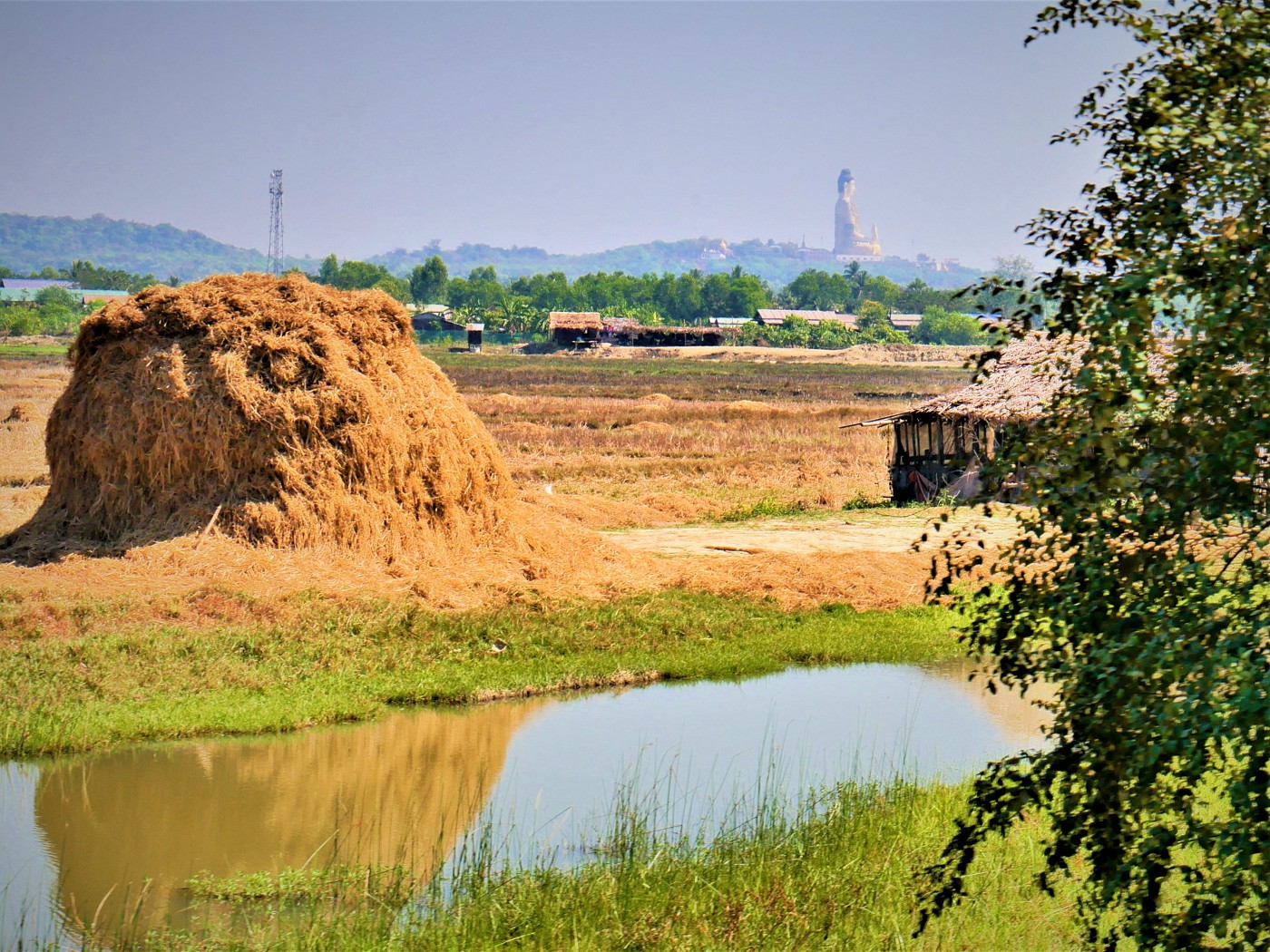
I learn later that this one is not – as claimed – the world’s largest seated Buddha statue, but most Myanma sources quote it as such. The tallest seated Buddha statue is apparently in Thailand and stands at 92 meters compared to 78 meters here in Kyaikto. As we roll into town, the statue isn’t visible often anymore.
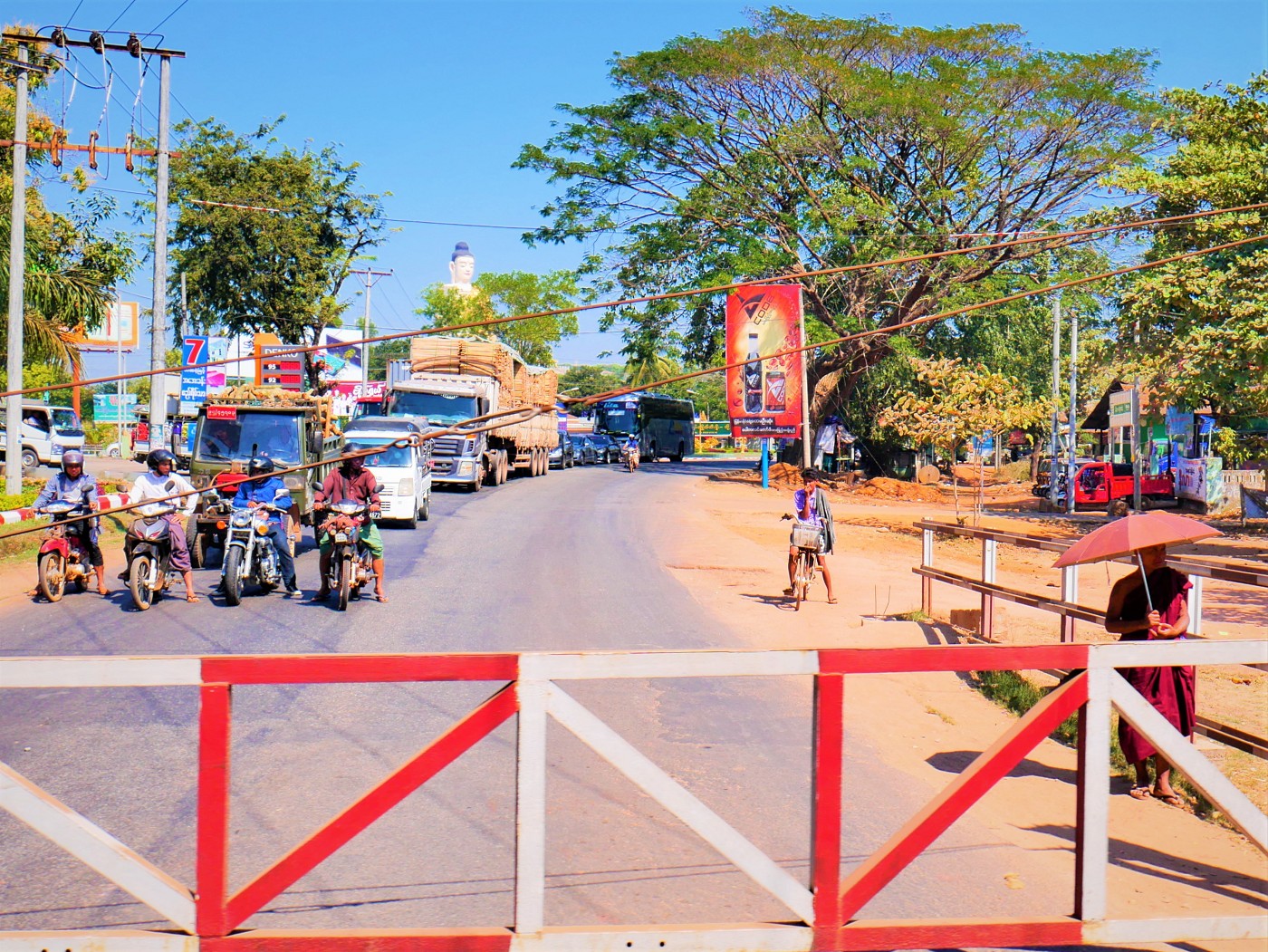
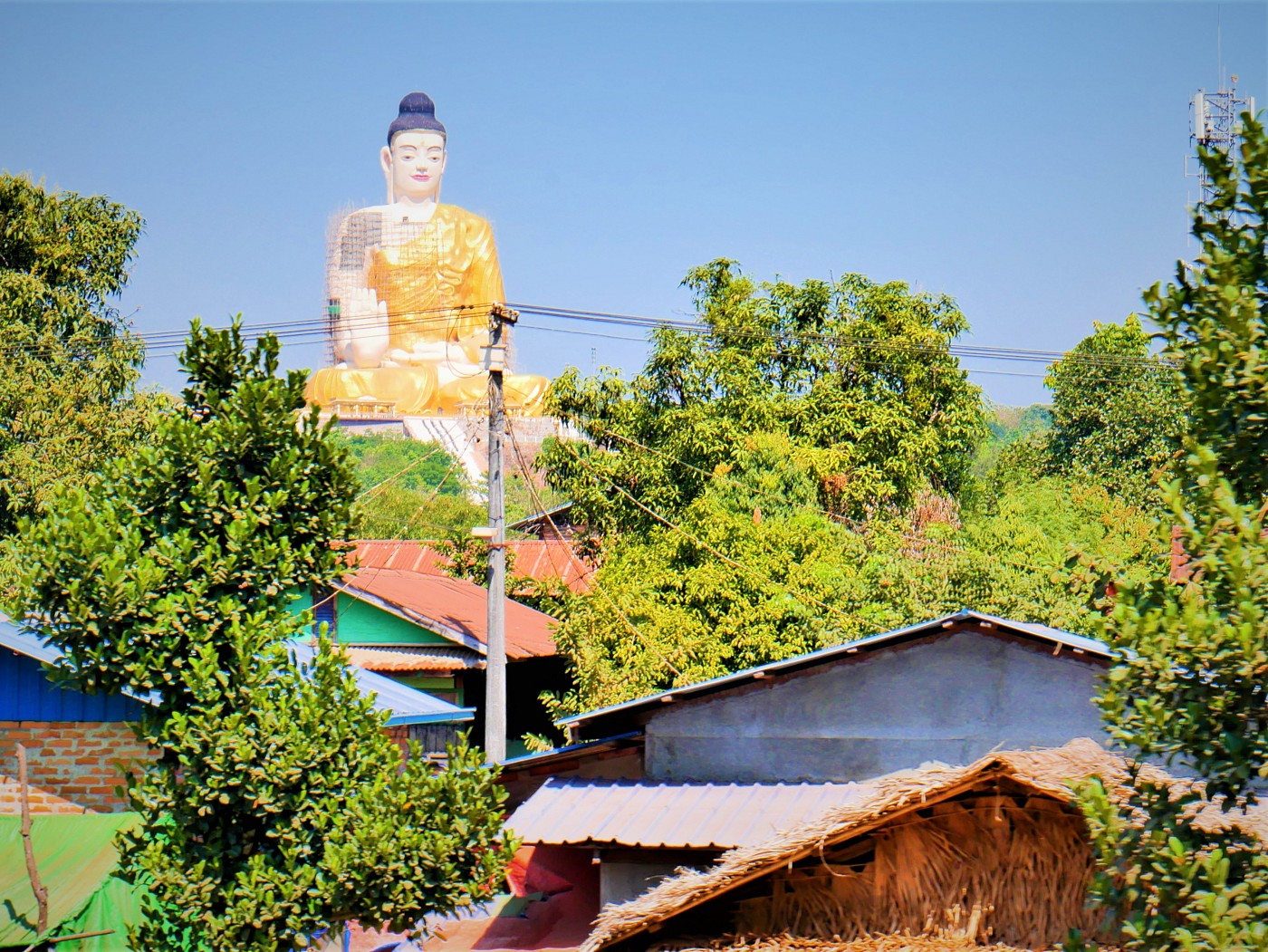
After Kyaikto, I nap some more. The biggest surprise so far is how much the train runs on schedule. This way, we’re definitely set to arrive before 17:00 and well before sunset.
The Most Beautiful Stretch and Candy Throwing
After another nap, we’re traveling parallel to a mountain range full of big monasteries perched atop. This is roughly between Theinzeik (သိမ်ဆိပ်), Thaton (သထုံ), and Paung (ပေါင်). It looks like a really good area to go hiking on the ridges. Around here, there are also Hindu temples, for variation. Some people use the irrigation ditches for fishing. Whenever we pass through a town, people aboard our train toss candies at the kids that are habitually waiting for this event of the day to catch them (see the kids running in the video on top of this page).
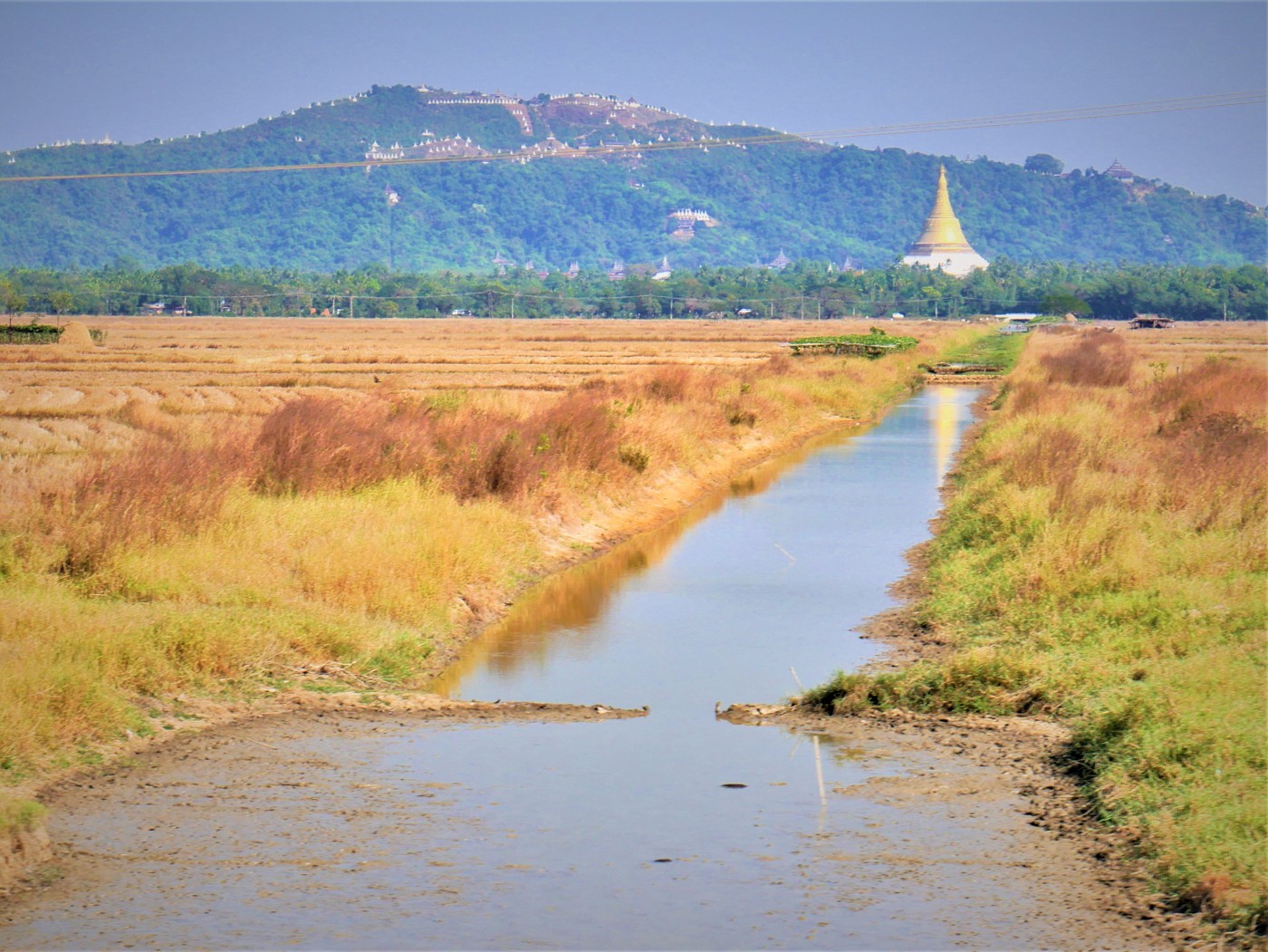
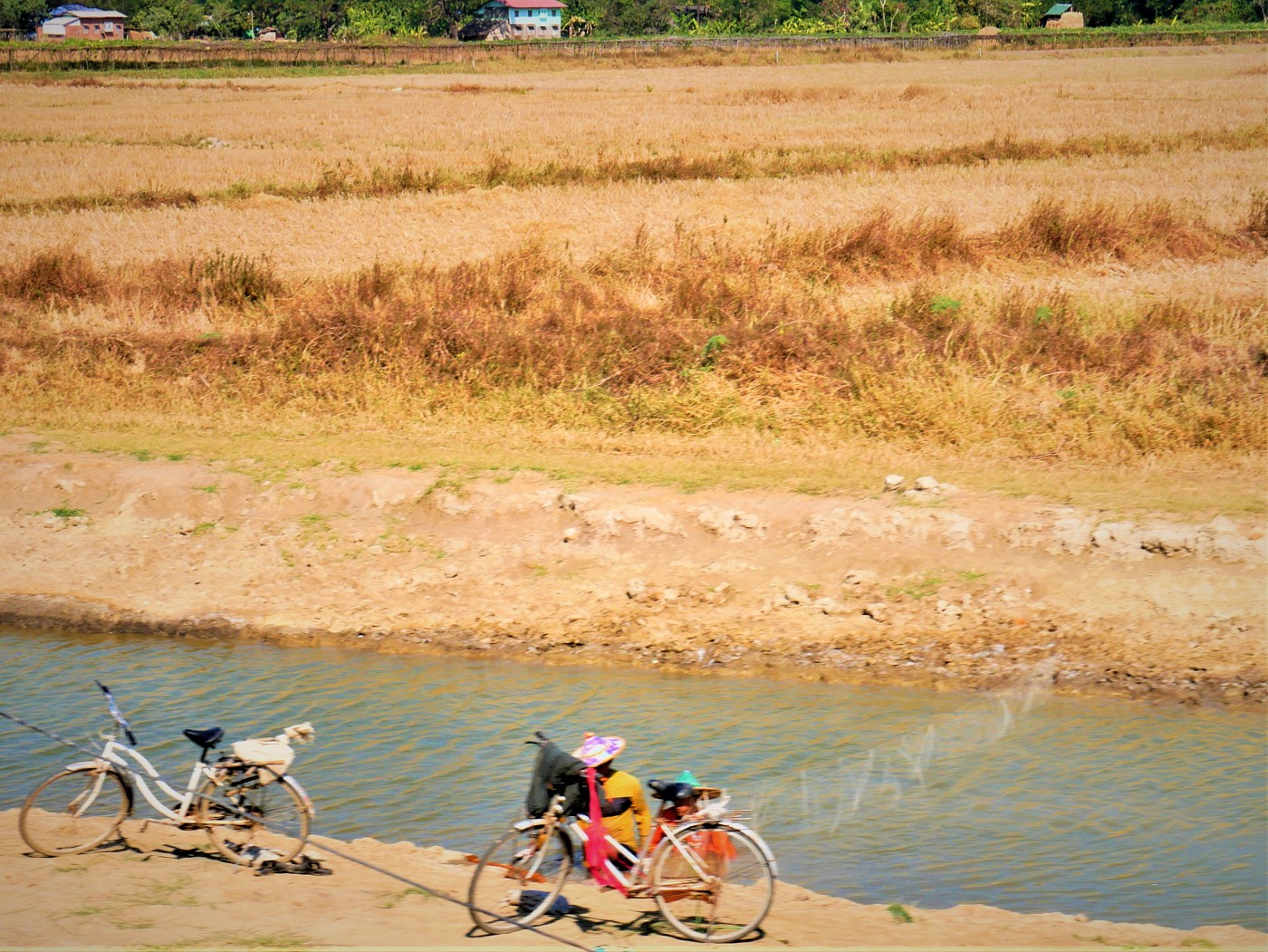
The train runs parallel to the road for some time, which means we can see what we’re not hitchhiking. I confirm one mapped tollbooth indeed exists in the real world. There are ceiling fans inside the train that have been turned on since the morning, but it doesn’t give much respite from the heat. The people on the west side of the train have resorted to rolling down the metal windows. I’m not sure if it helps.
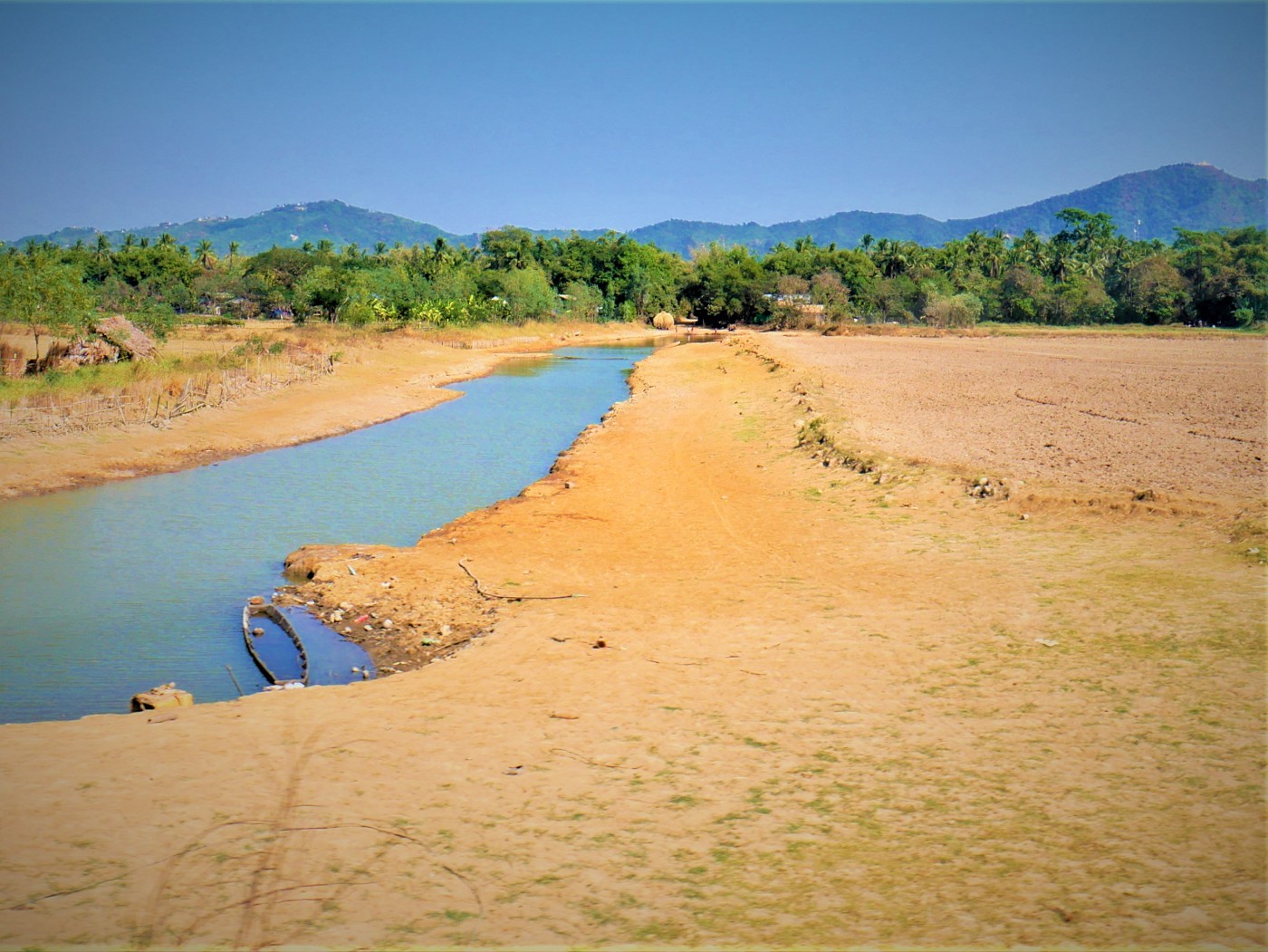
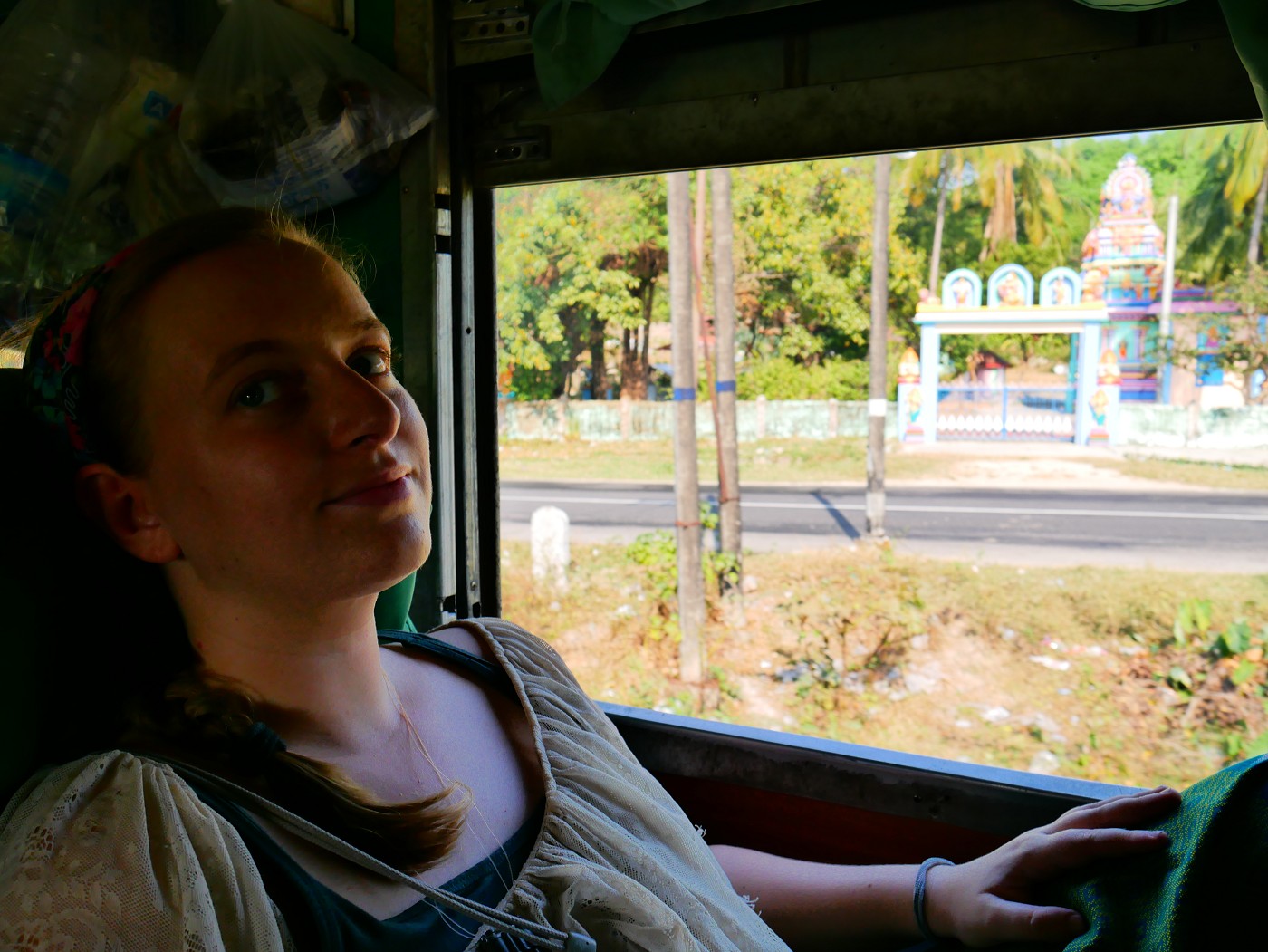
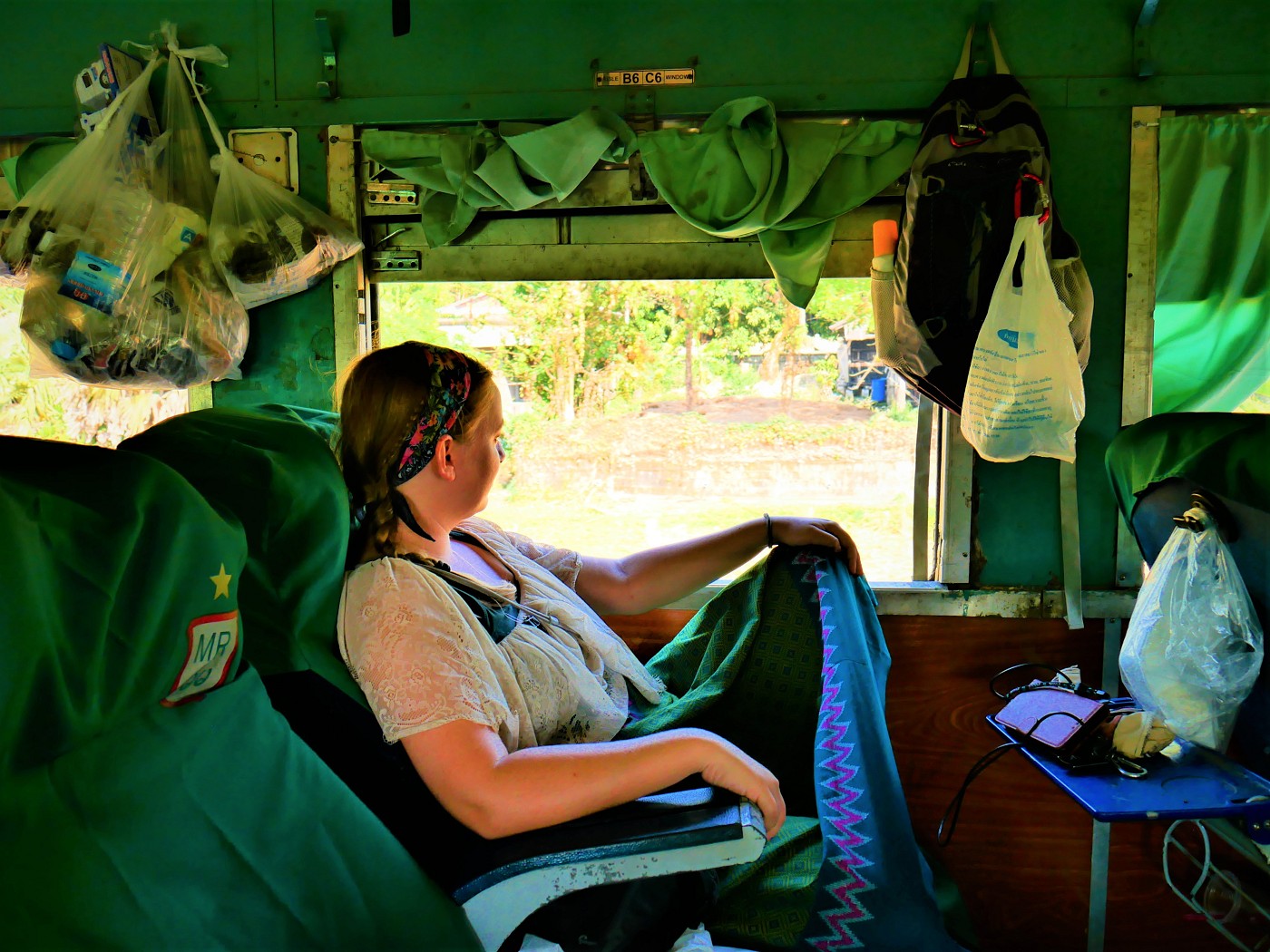
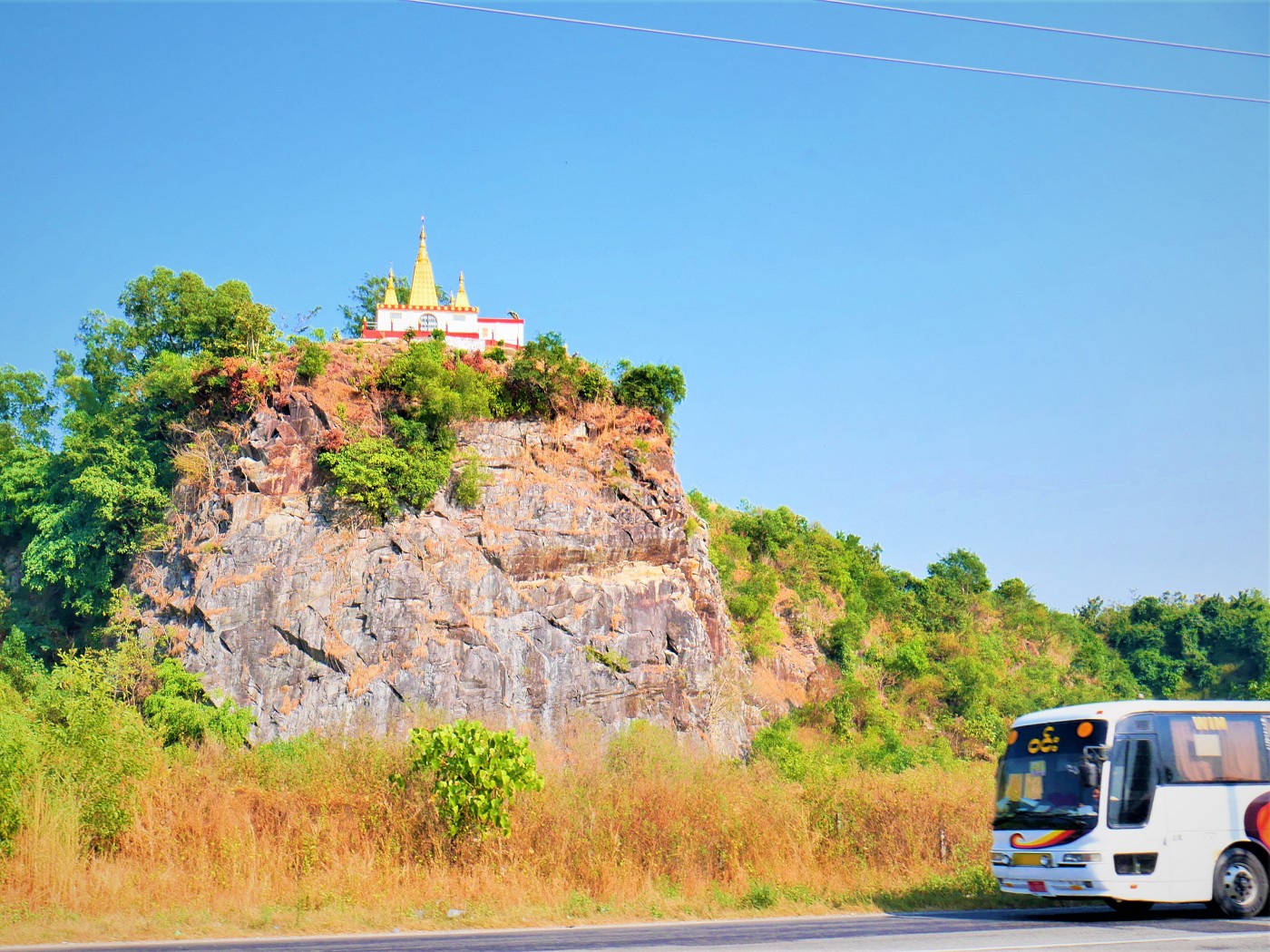
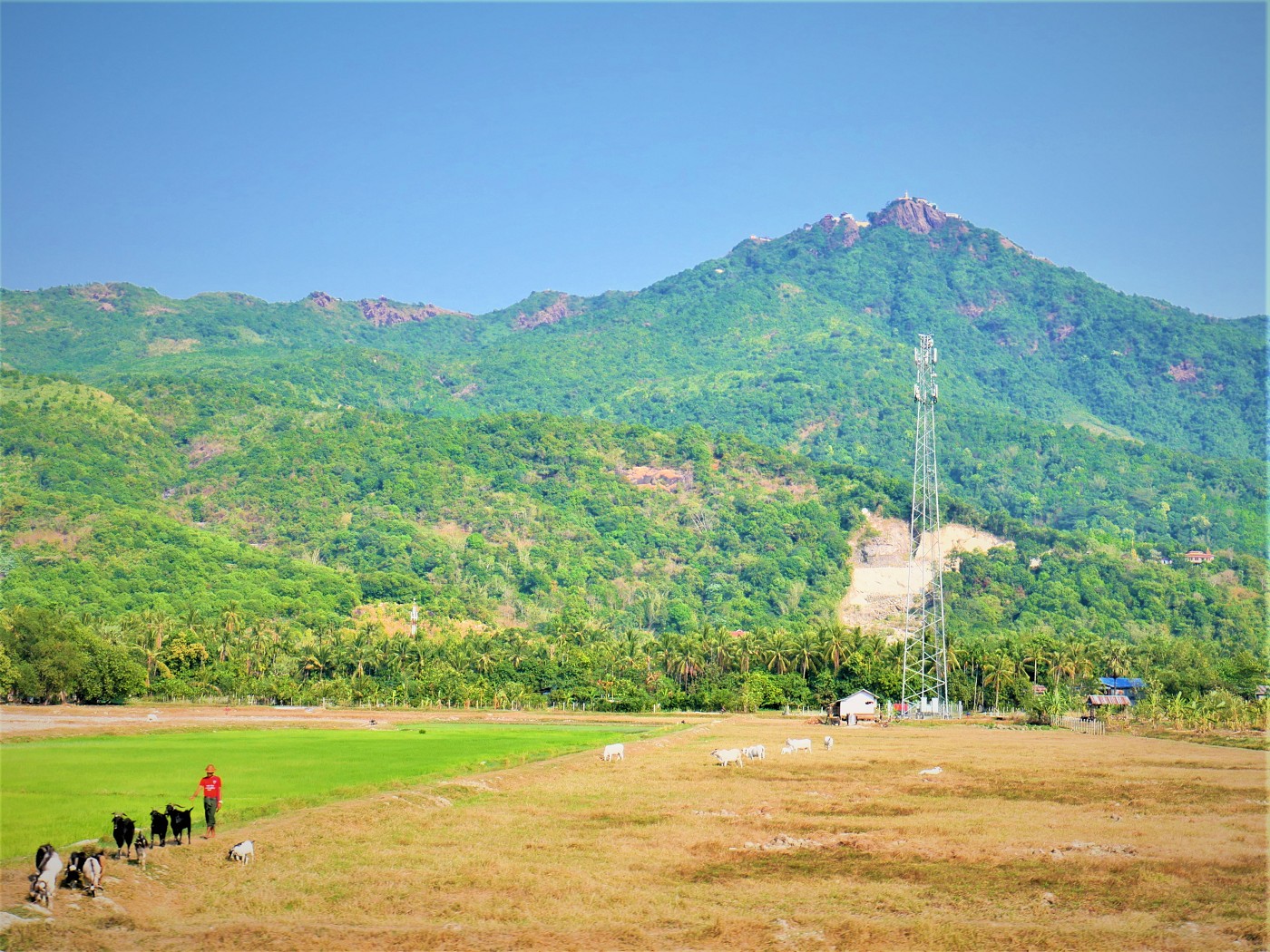
Near Zin Kyaik (ဇင်းကျိုက်), we see the path of a waterfall that should probably work in the rainy season. One hillside shows the aftermath of a landslide, which does mean that this dry place can receive destructive quantities of sky juice. That hill also contains a dome-shaped radar system, also good for heavy weather.
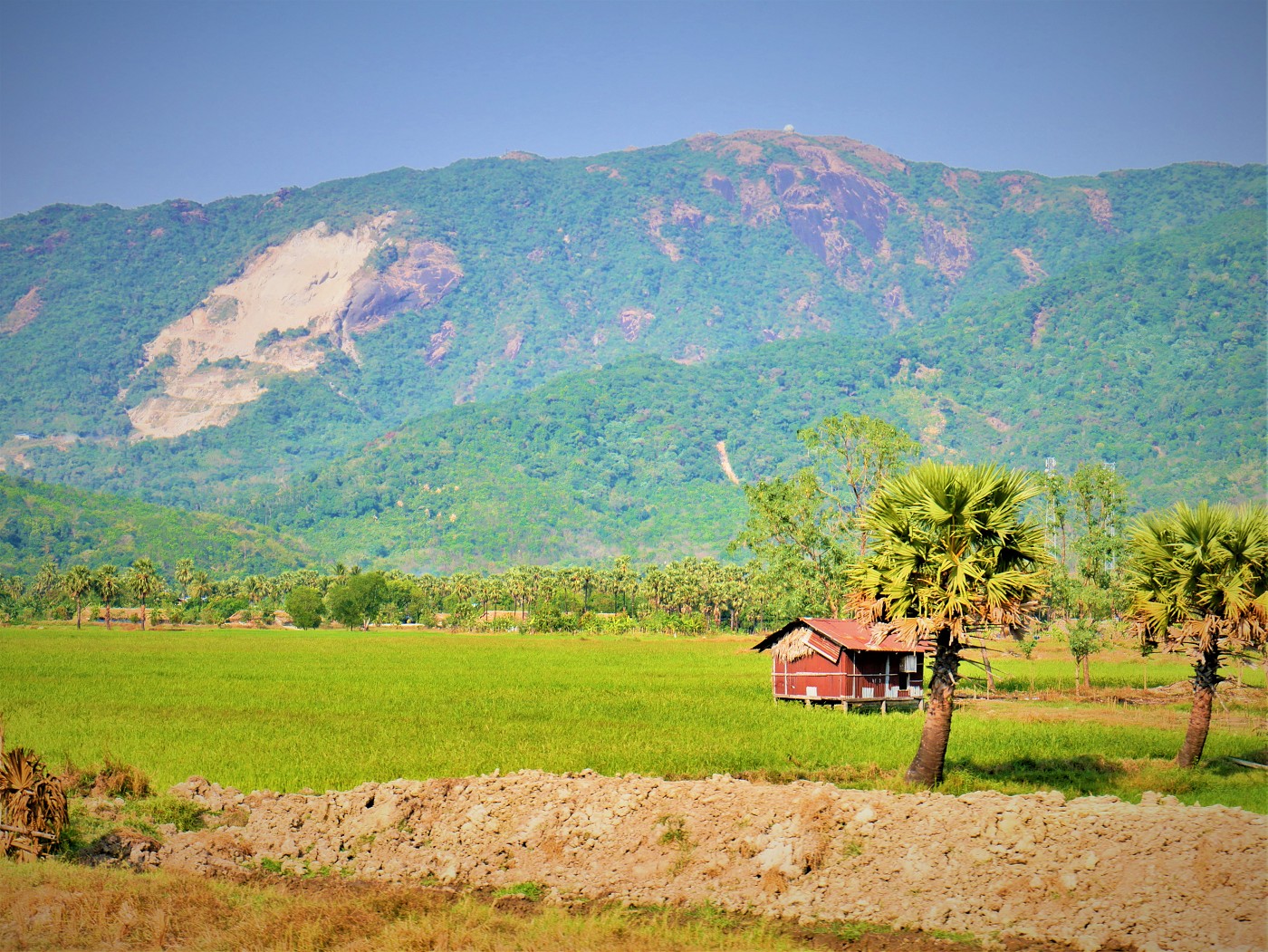
Approaching Mottama
A southeastward turn reveals my favorite pagoda of the day: the Paw Taw Muu pagoda just after Paung.
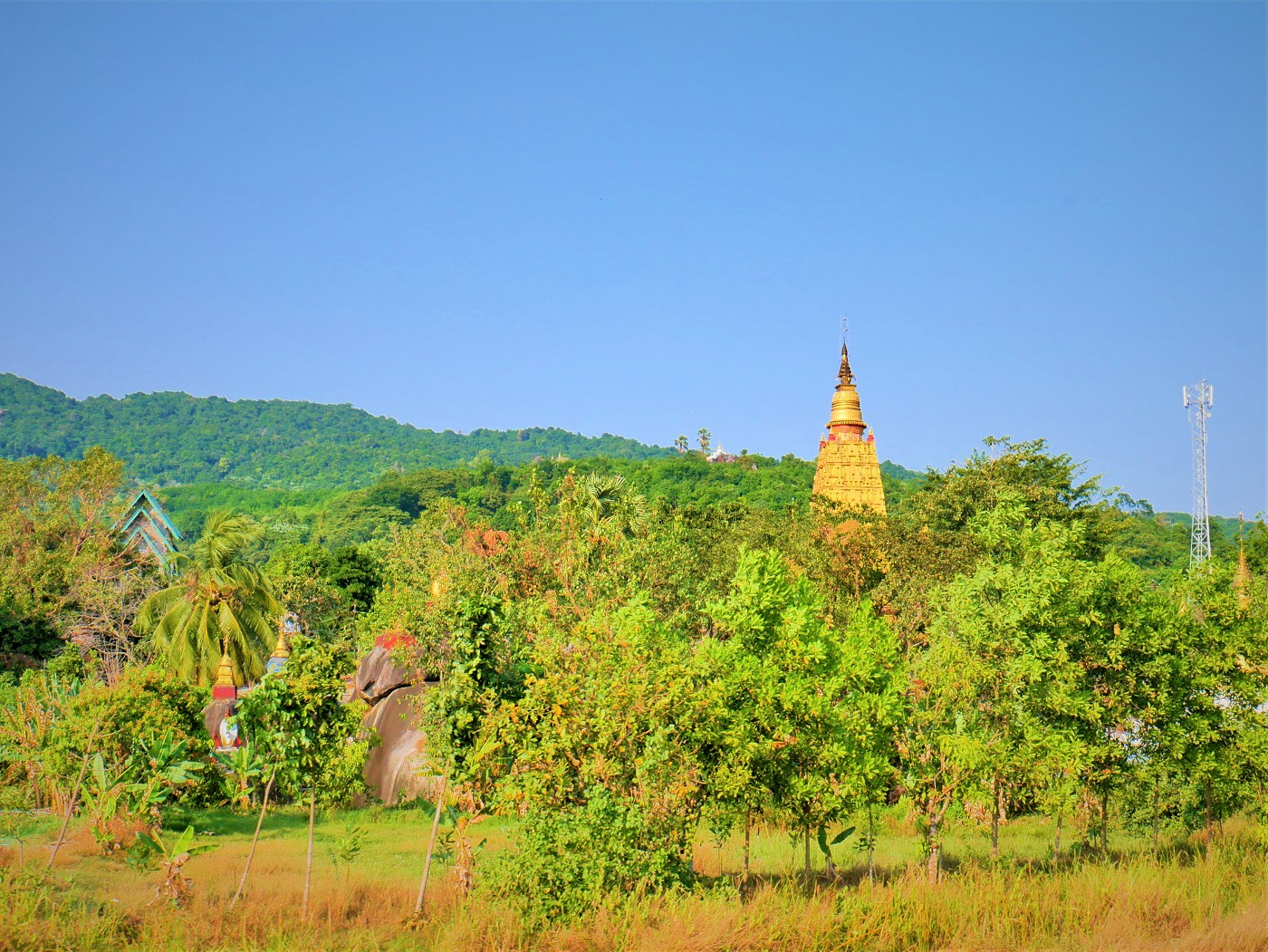
The right-hand side of the train reveals deltaic flatland in contrast to our side which shows Mottama (မုတ္တမ) city. My map anticipates an abandoned railroad track, so I move to the right to spot it. It did not disappoint.
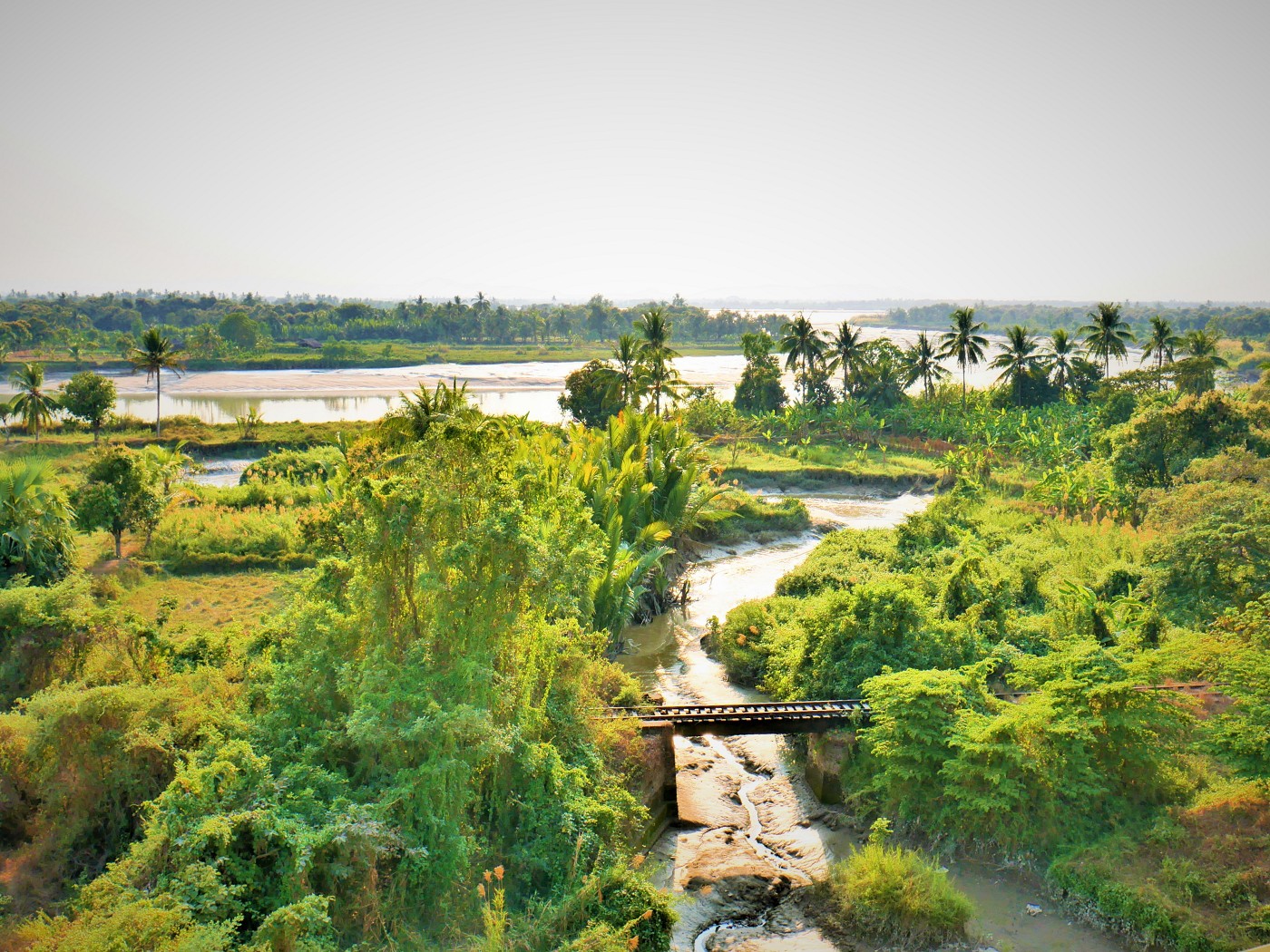
Soon after, we’re approaching the gigantic Thanlwin bridge that spans the river delta of the same name for more than 2 kilometers. Counting the parts on land, the whole road-rail bridge is 6.6 kilometers long. Across the bay, we see the outline of Mawlamyine. Finally!
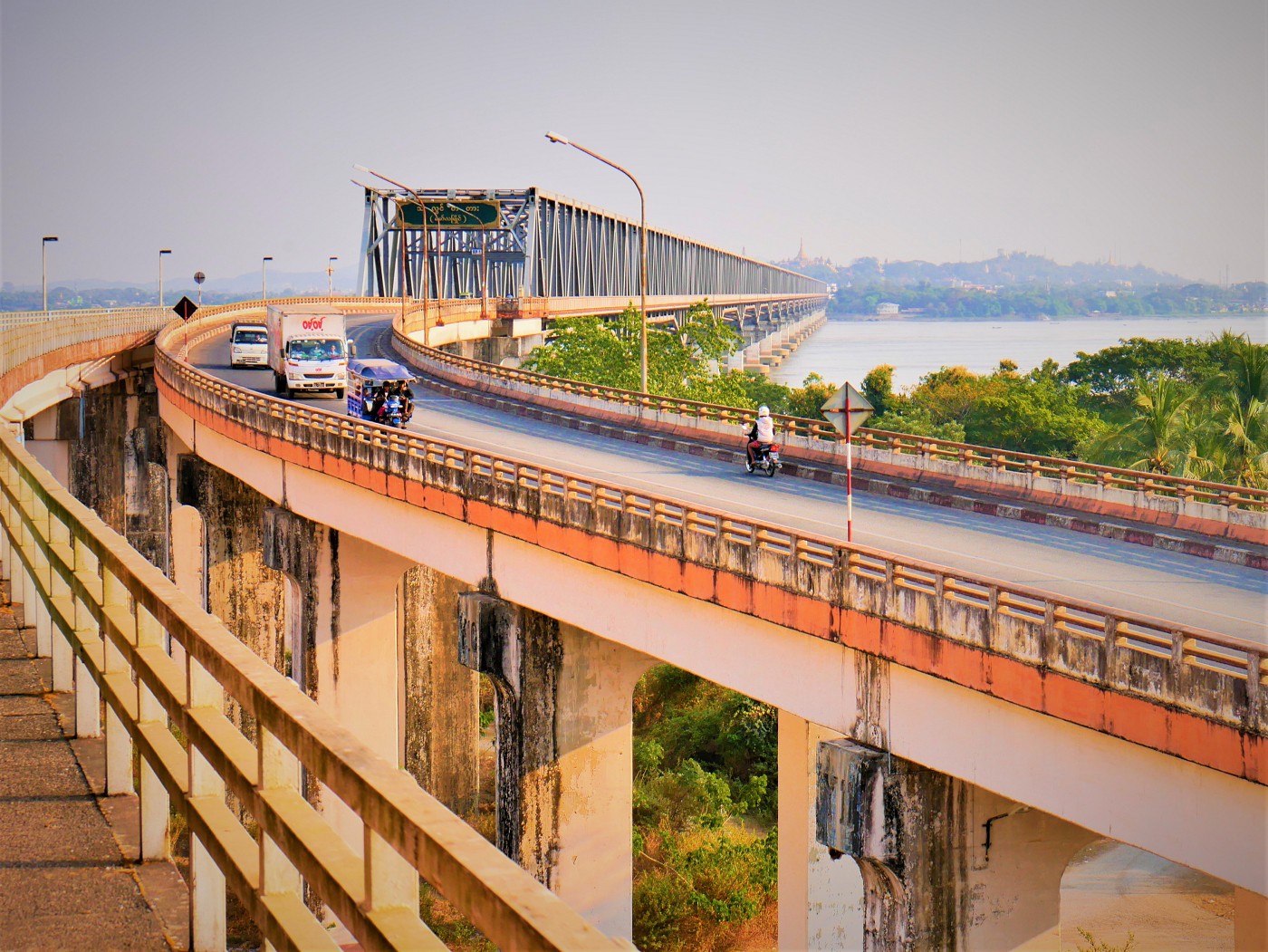
Many other passengers had been looking forward to this moment, shown by the many people who also stuck their phones and heads out of the window to see the approach. This is Myanmar’s second-longest bridge, after the Pakkoku bridge we’d spotted during our Irrawaddy river cruise from Mandalay to Bagan. It was completed in 2005, while the Pakkoku bridge opened in 2012. Myanmar has been on a bridge-building spree.

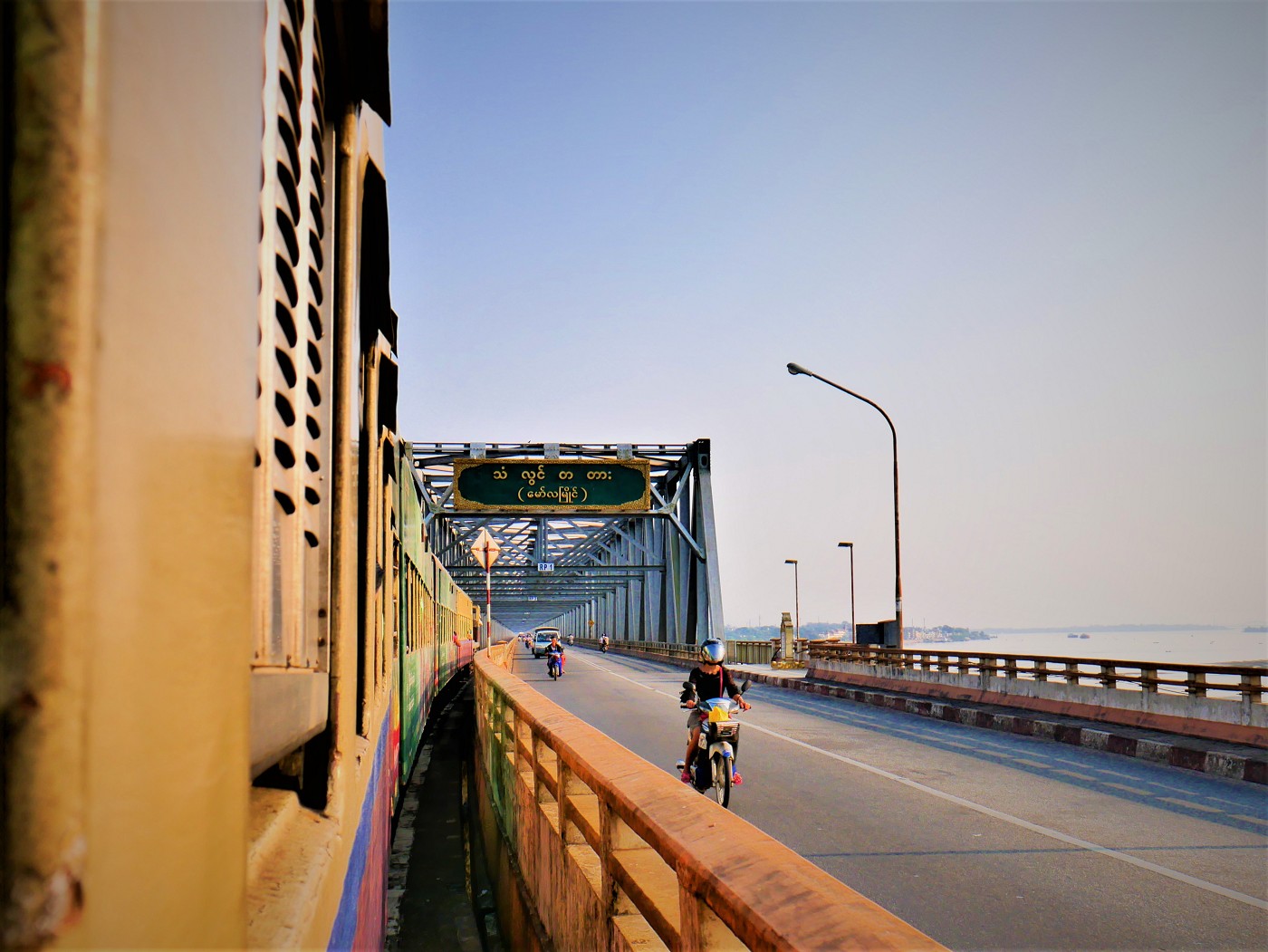
While crossing the bridge, we also get a good look at Shampoo Island, where I wanted to go the day after this long train journey. I check it out from one of the precariously open doors of the train car.
Arriving in Mawlamyine
On the other side of the river, we’re still on a bridge above the city for kilometers on end. We pass temples and mosques, distinguished by their architecture.
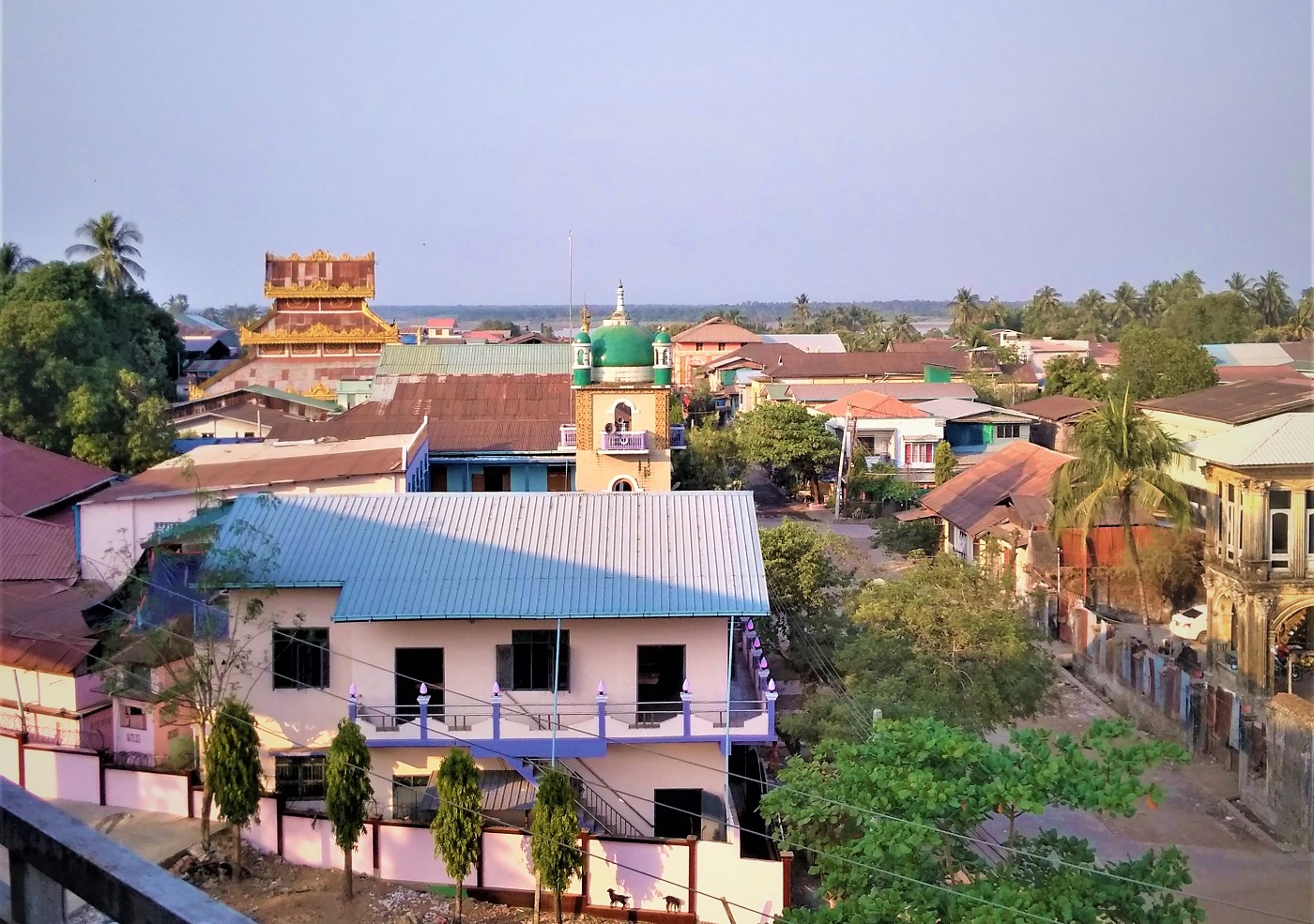
We roll into the Mawlamyine train station, where we see this funny vehicle on the rails. It’s 16:30.
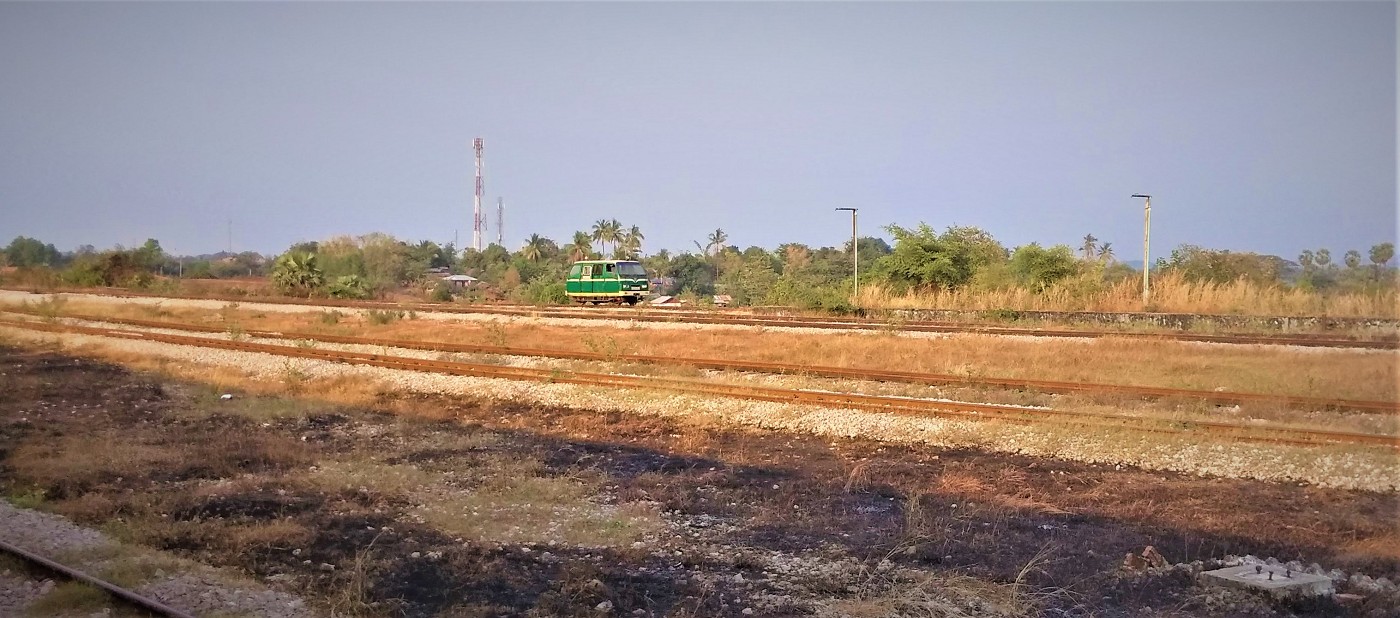
Once we’re out, we first orient ourselves before we find the nearest tuk-tuk. With the help of another driver, our driver agrees to take us to the Thanlwin Seesar Motel. The price for the tuk-tuk was 3,000 MMK
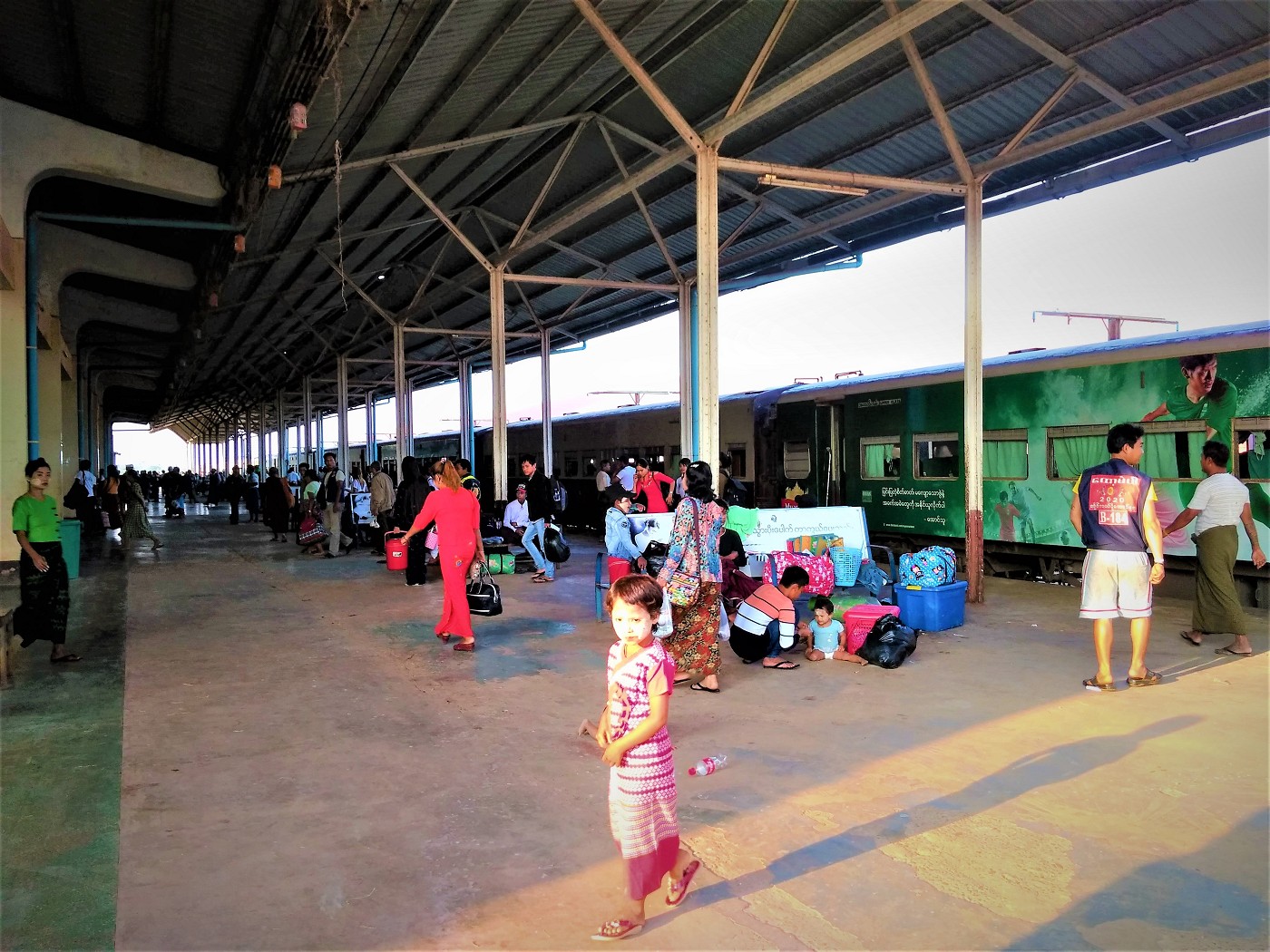
It’s a long drive from the train station to the inner city. The helpful staff guides us to our room for the coming two nights, where we freshen up before we head out to eat some vegetarian food at May South Indian Chetty Restaurant. There’s a nice esplanade next to the river, where we witness the sunset.
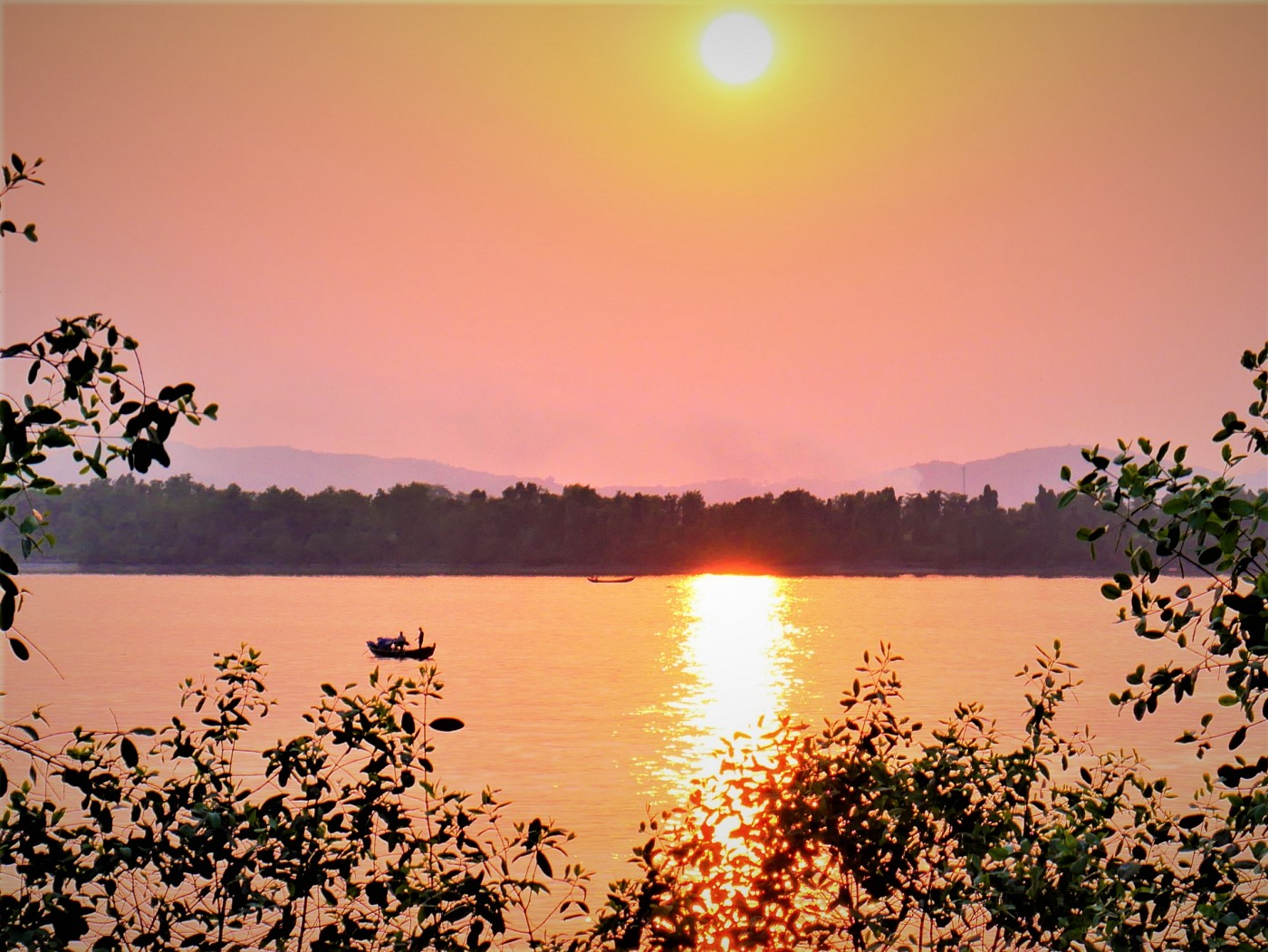
Trains in Myanmar Tips + Route Map
I’m not sure how fond I am of taking the train. Whether in Germany or Myanmar, I think the view from the windows is quite shit because it’s sideways. The pros of taking a train in Myanmar is that it’s A) dirt cheap and B) the windows are nonexistent, making it easier to take good-ish photos from a moving train.
Now on to the summary:
- The ticket price is 4,250 MMK per person in upper class in January 2020
- It takes about 10 hours to complete the journey
- Bring enough water
- Wet wipes for hygiene
- Snacks if you don’t want to buy food aboard.
- Bring toilet paper if you plan on using the toilet. The toilet is a seat with a hole above the tracks, so it’s best not to use the toilet while at the station.
- Wear your comfiest clothes.
- Get your morning coffee after leaving Yangon
- If you like throwing candy to kids, you can buy that from the vendors aboard the train
